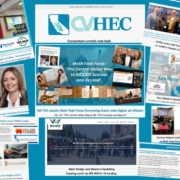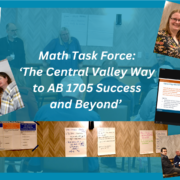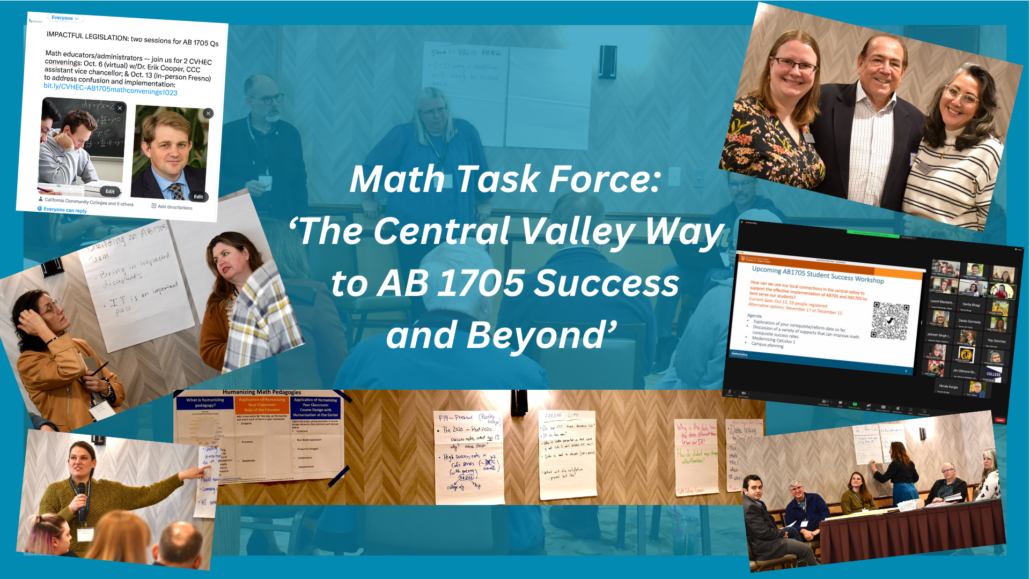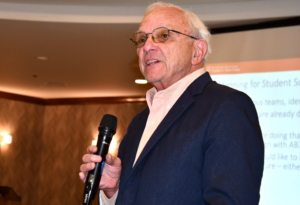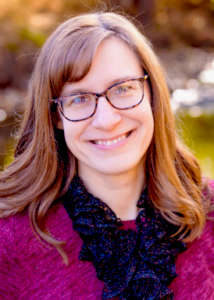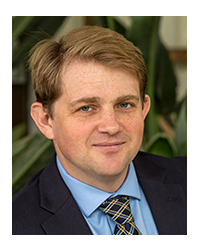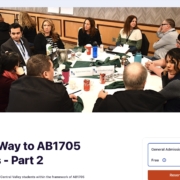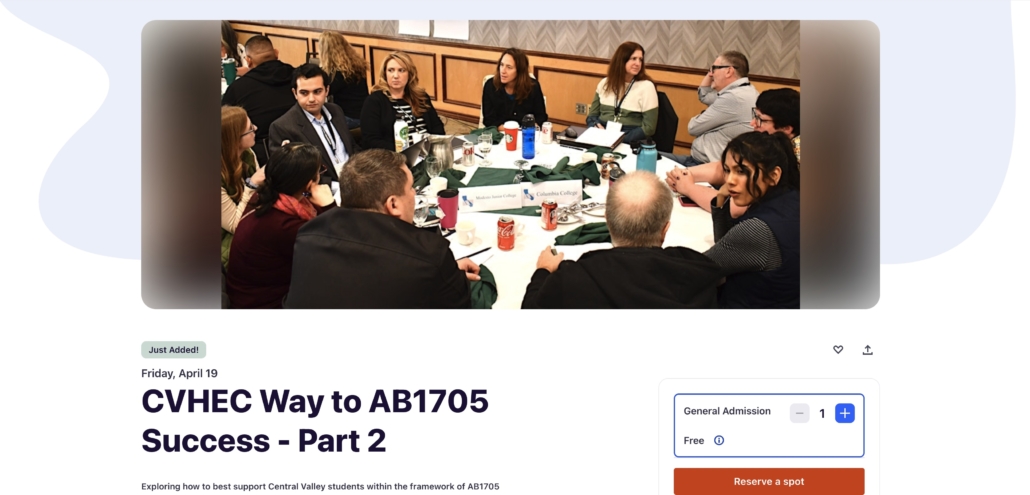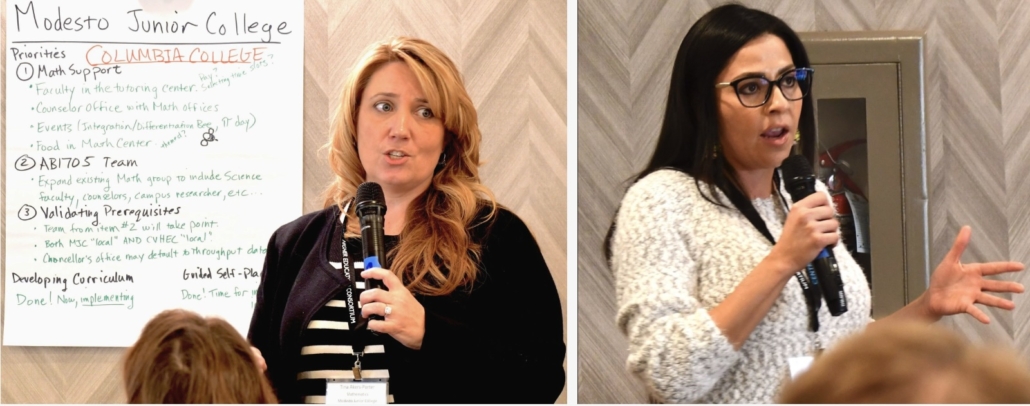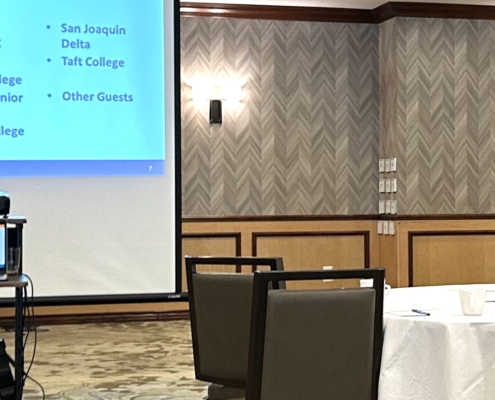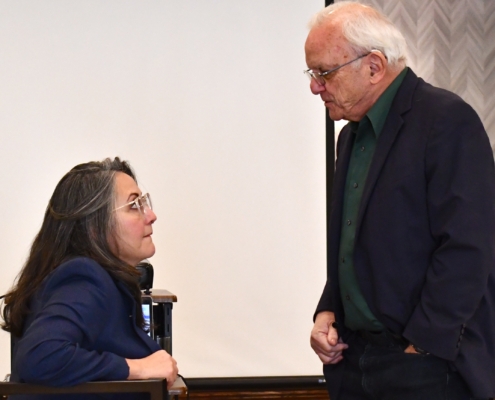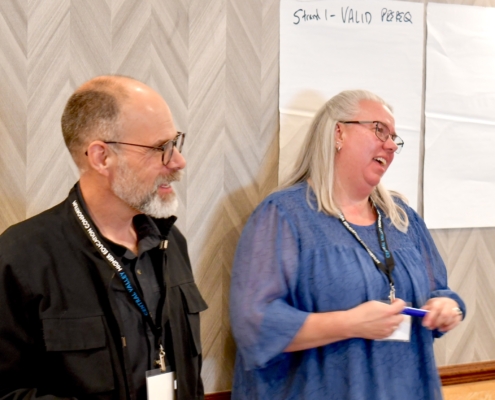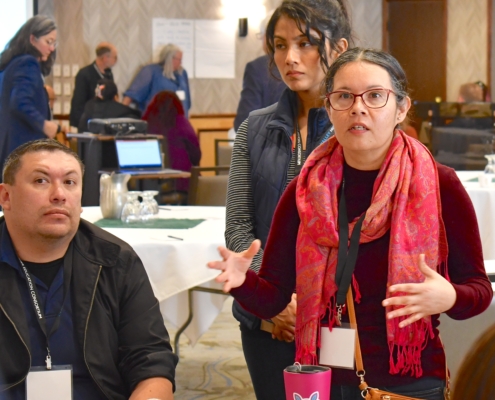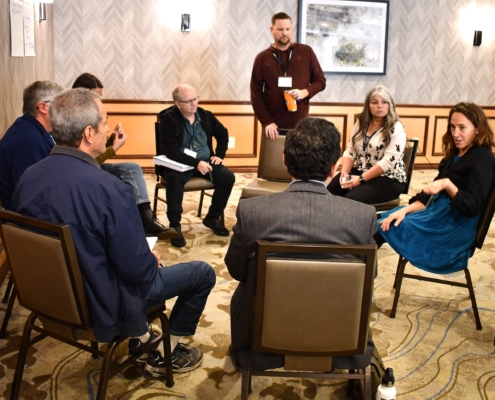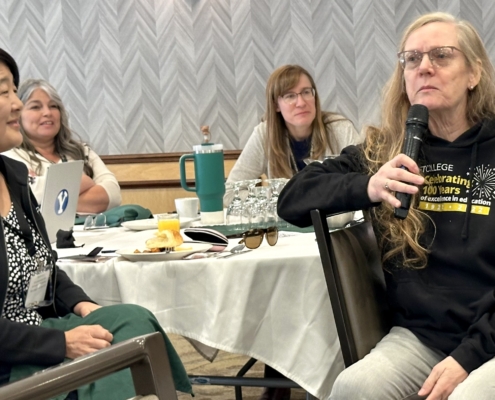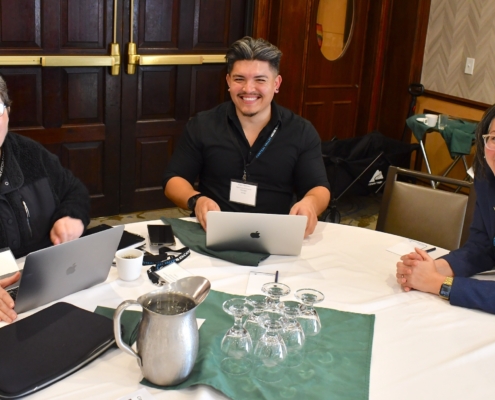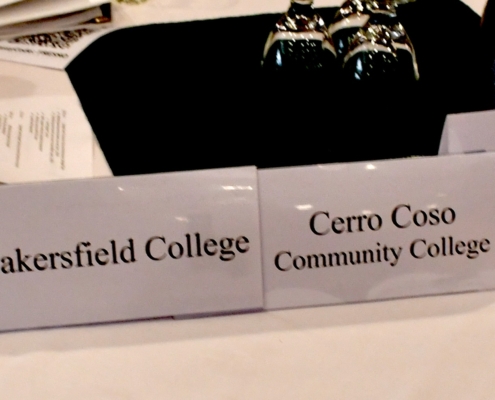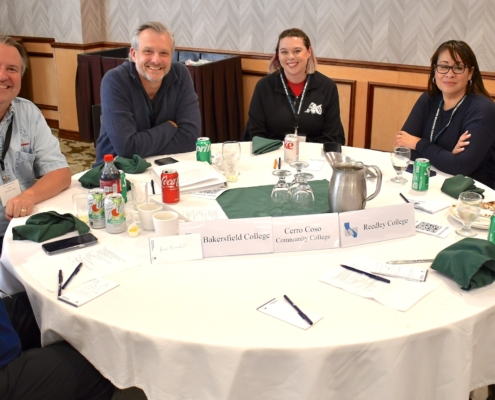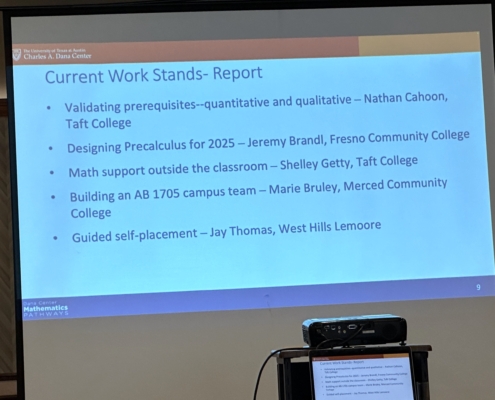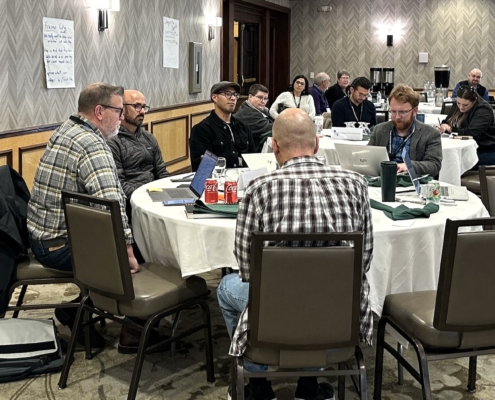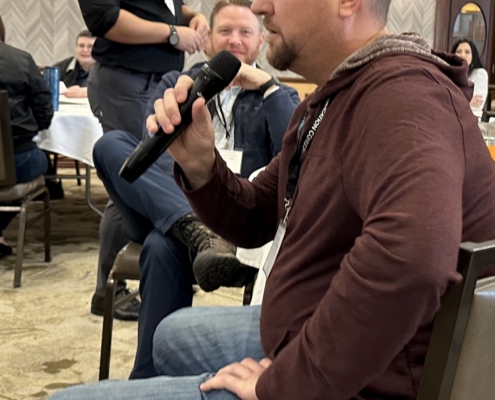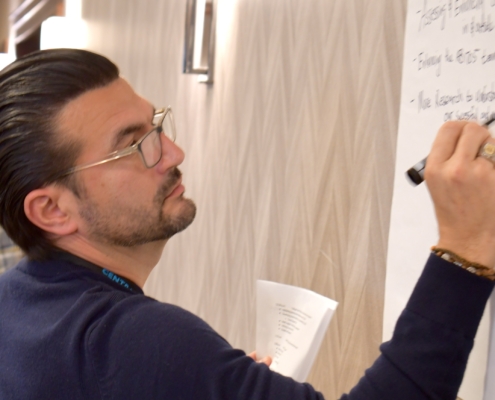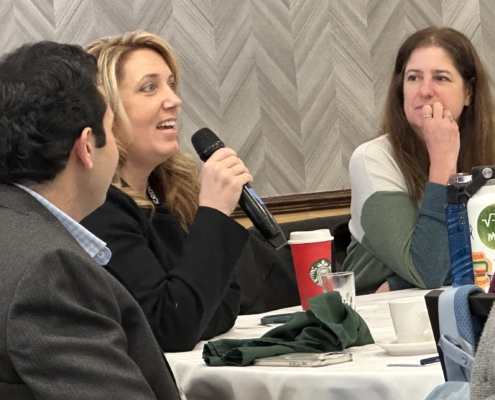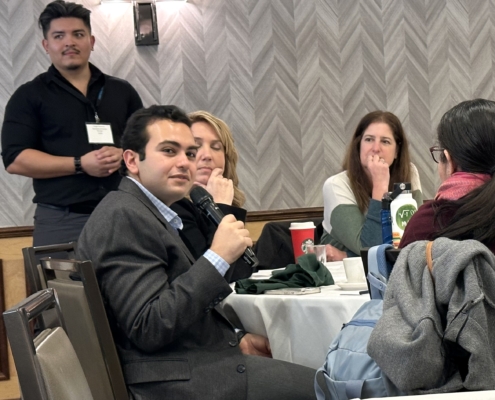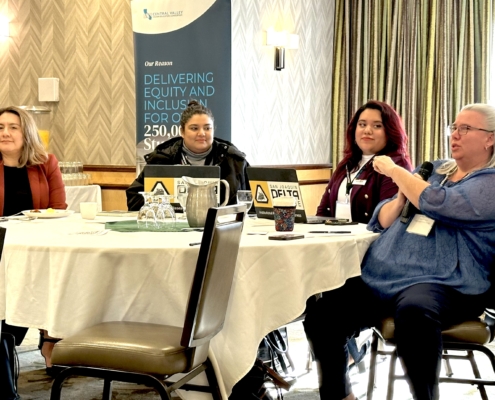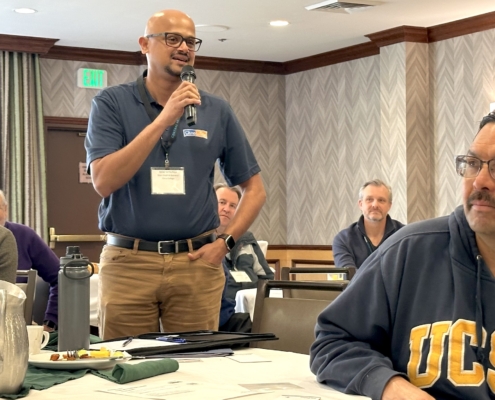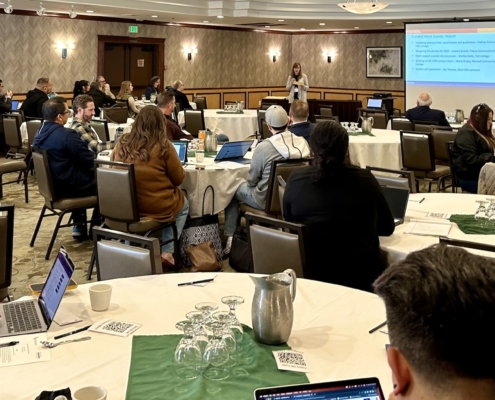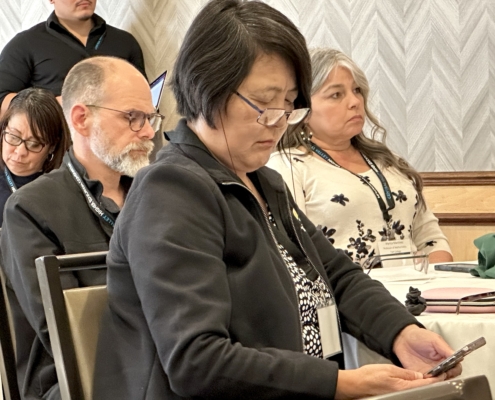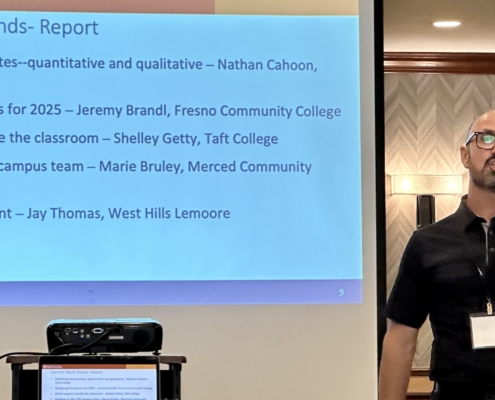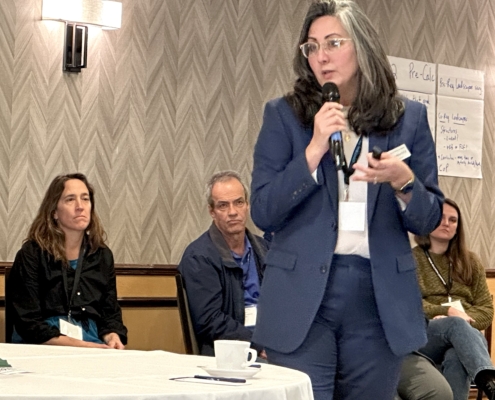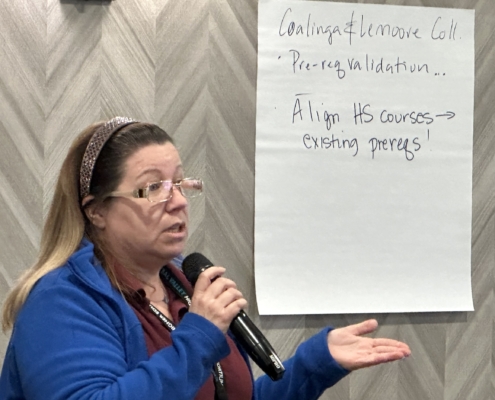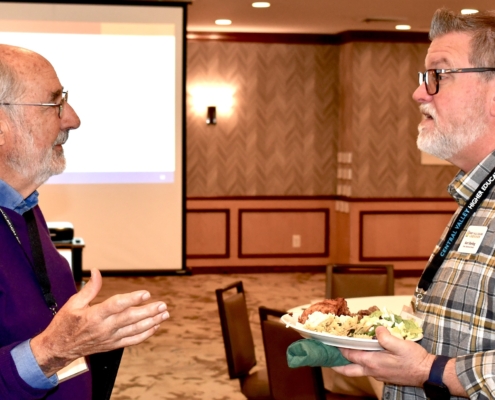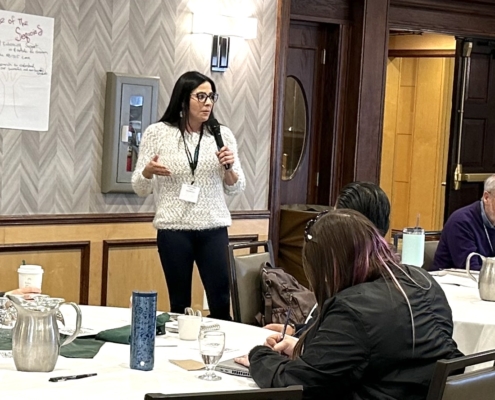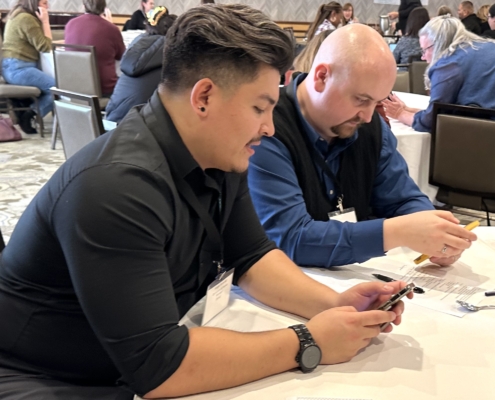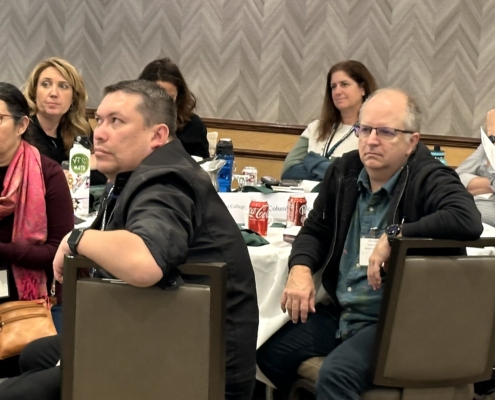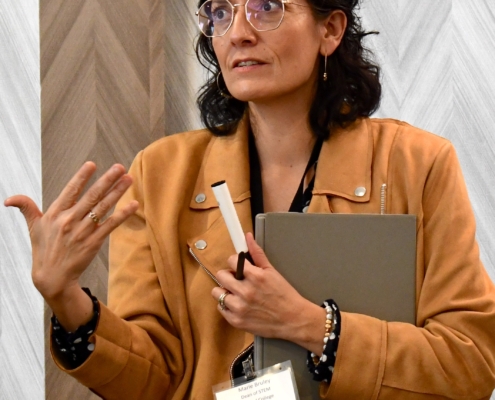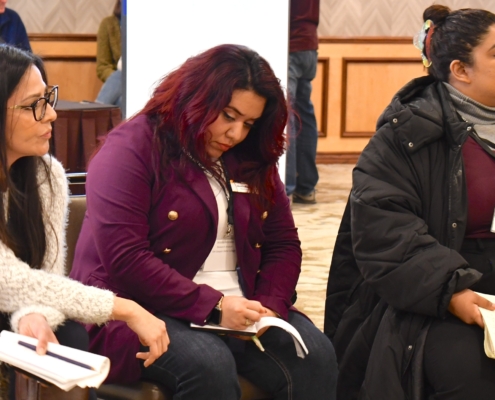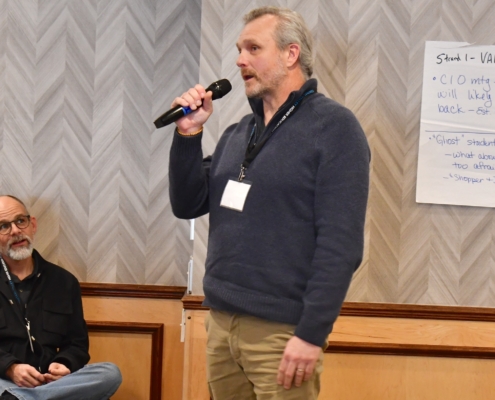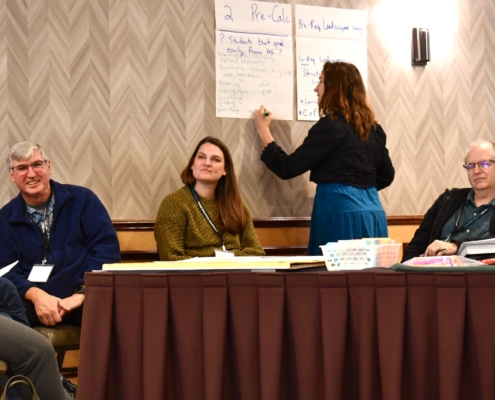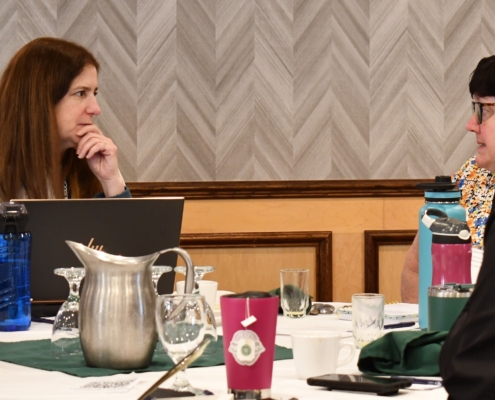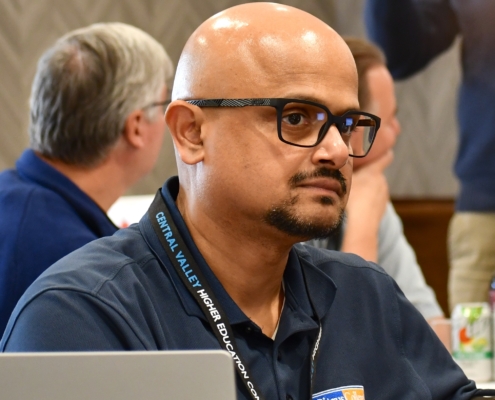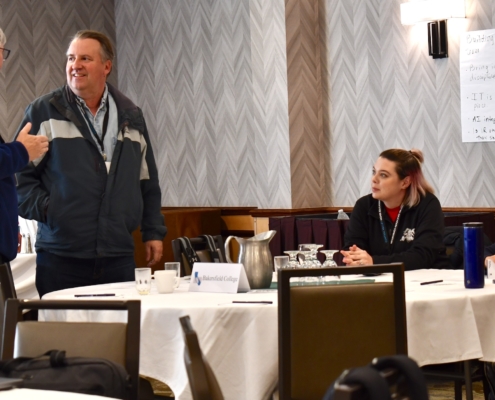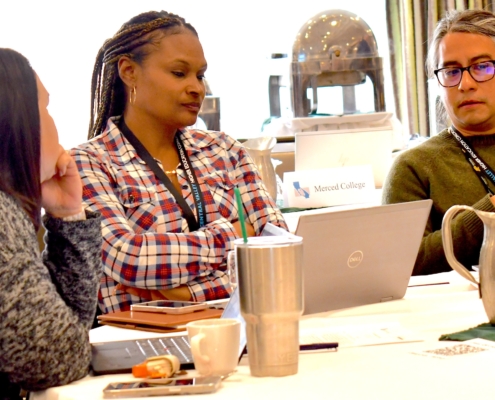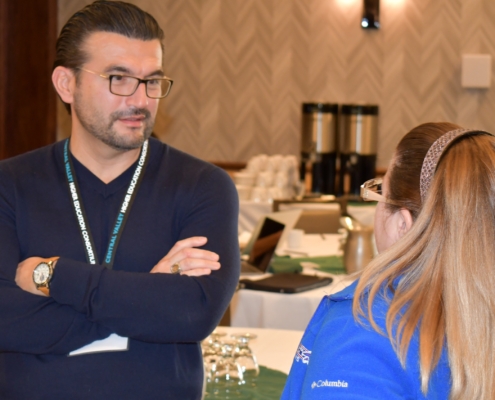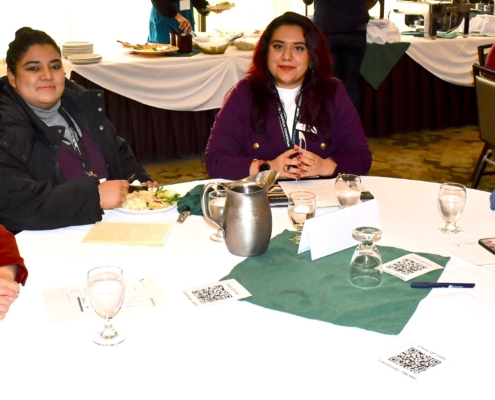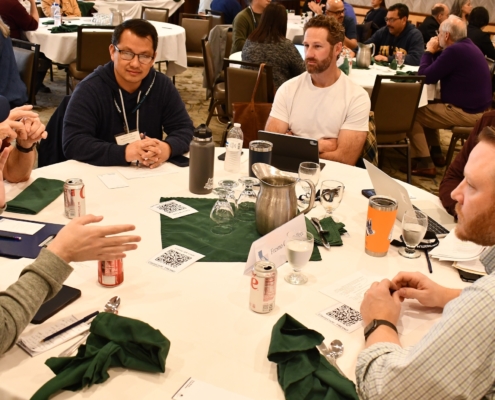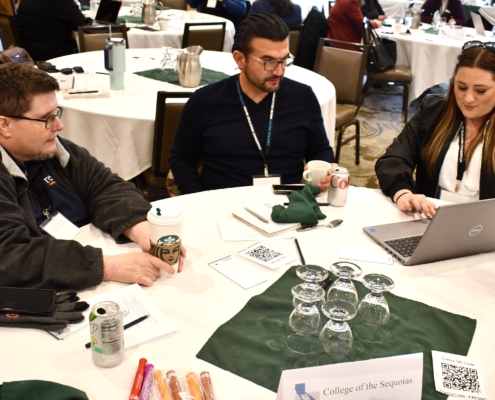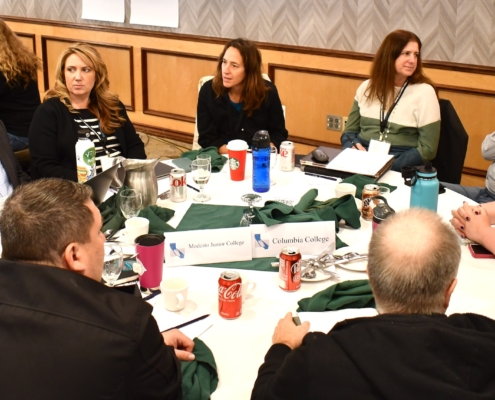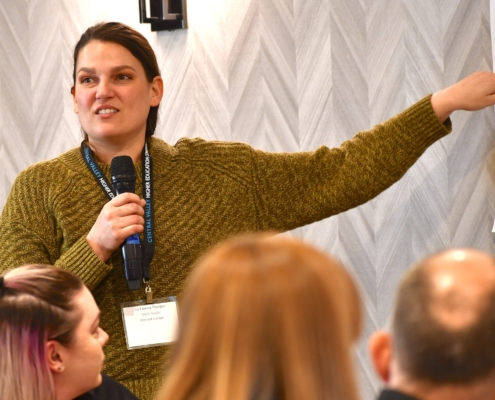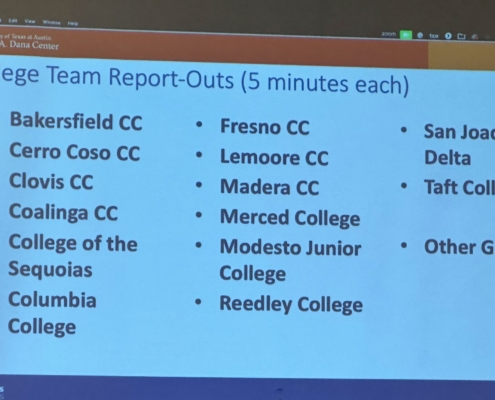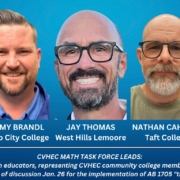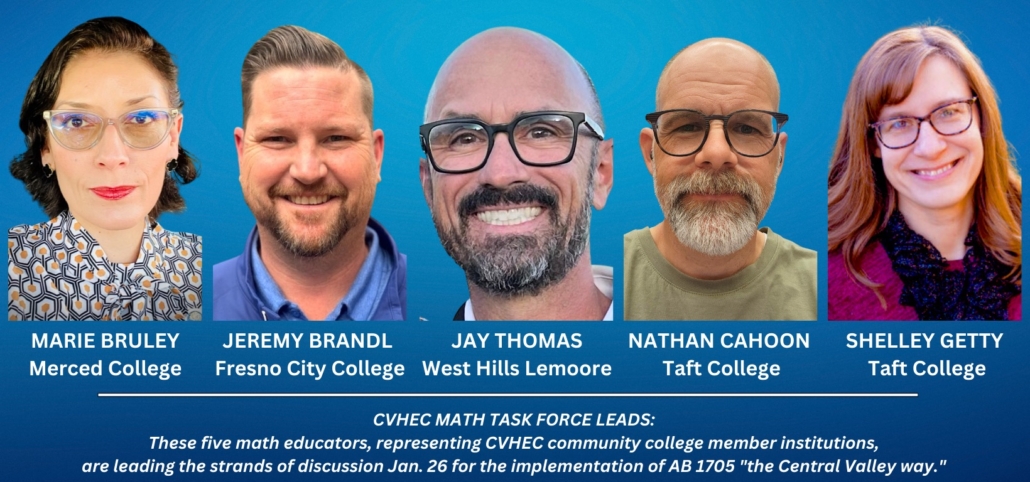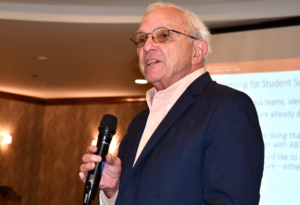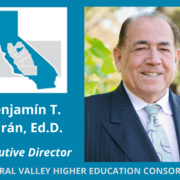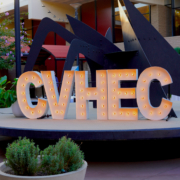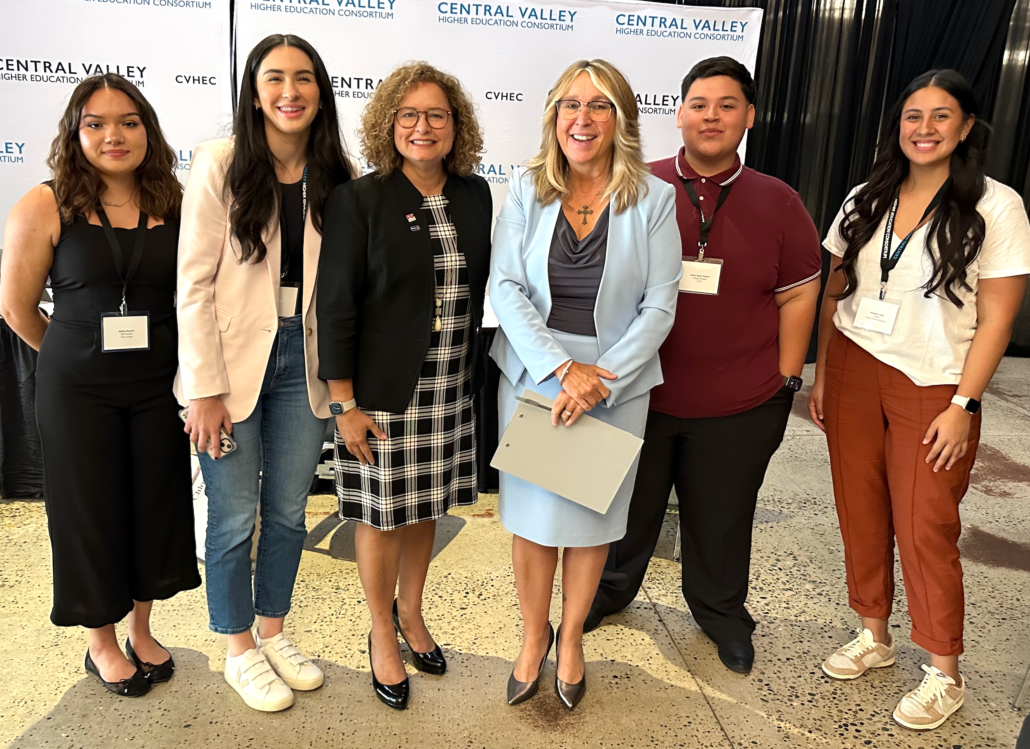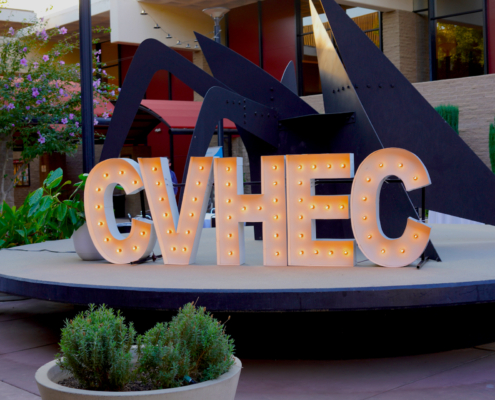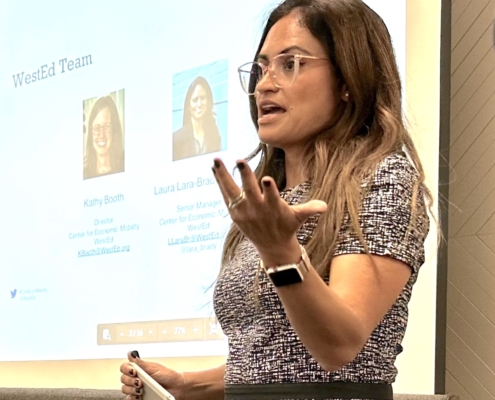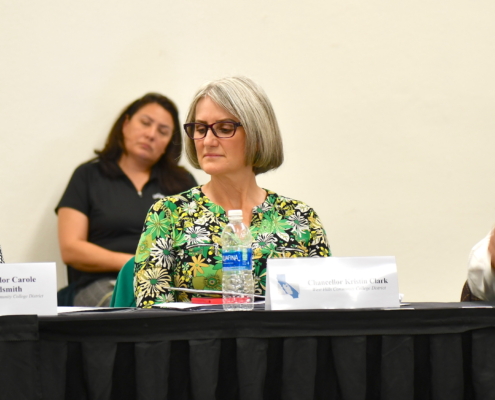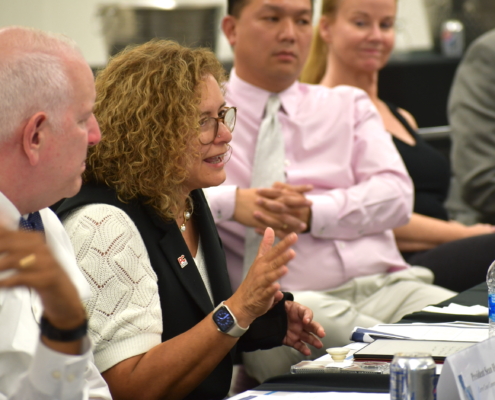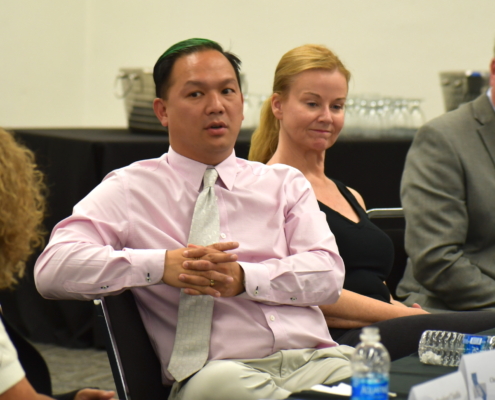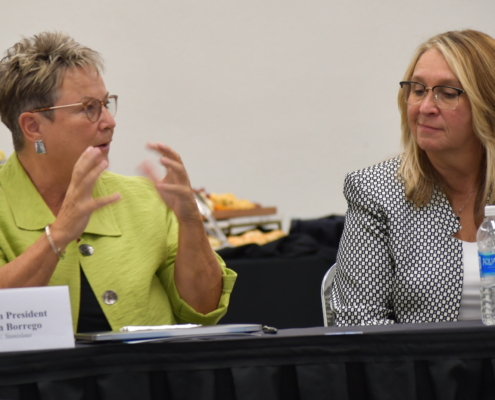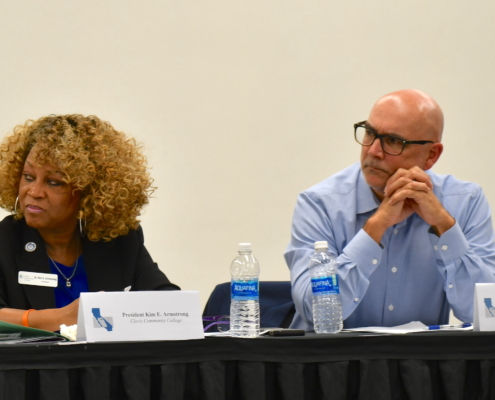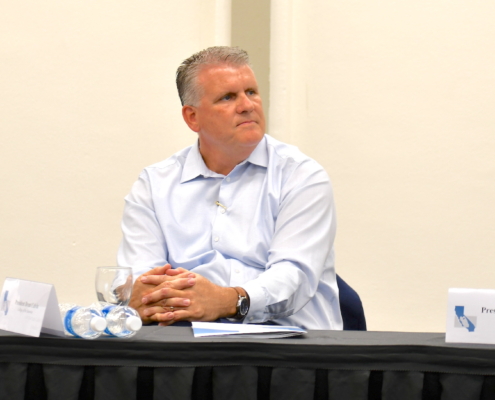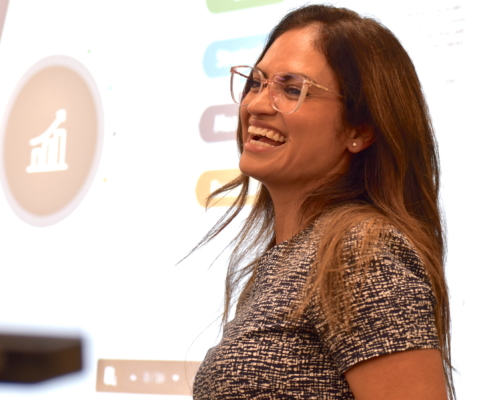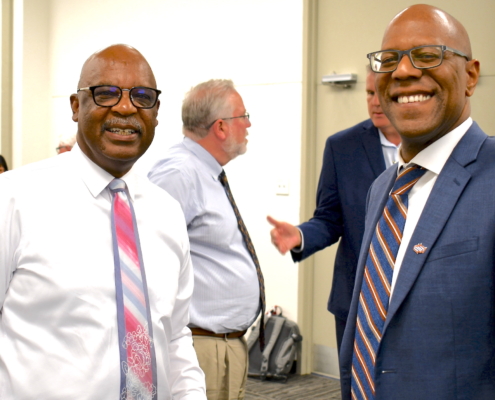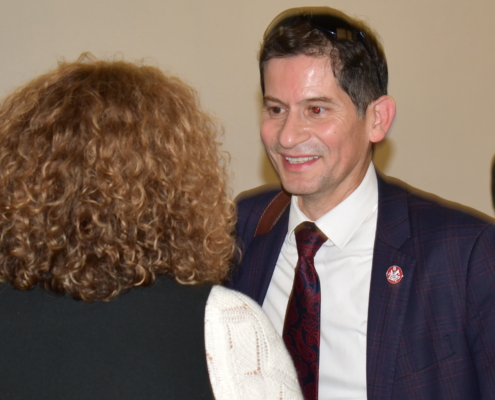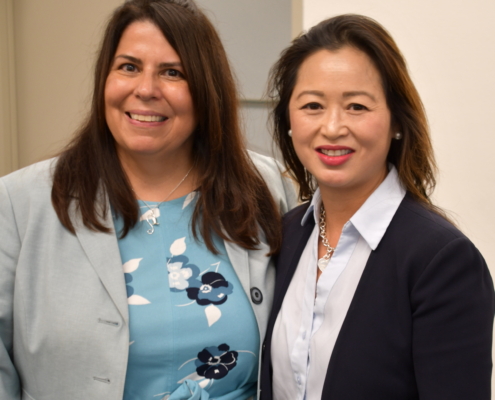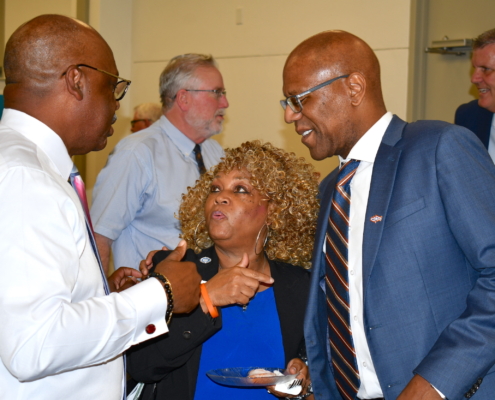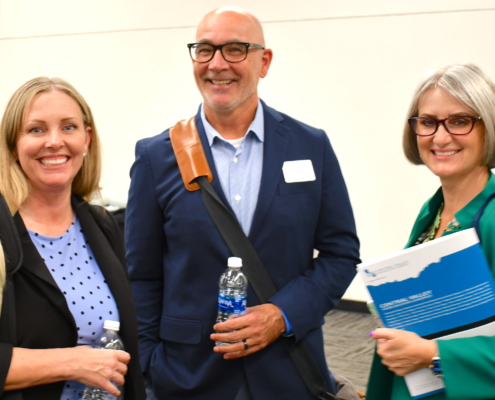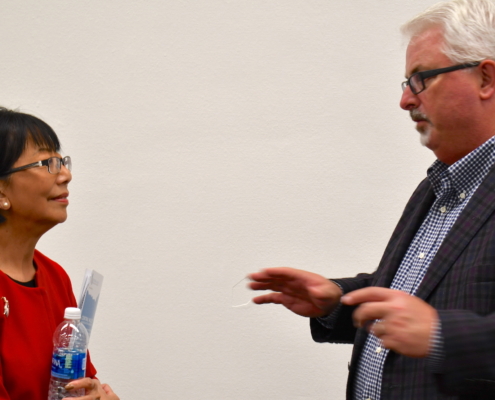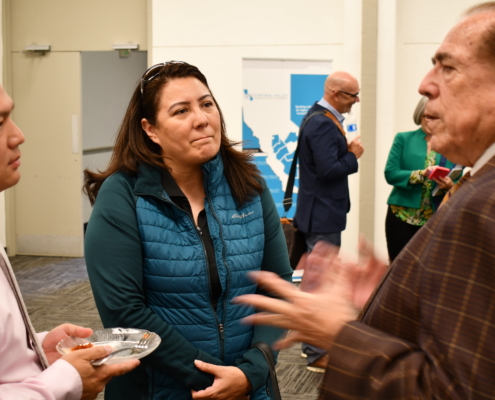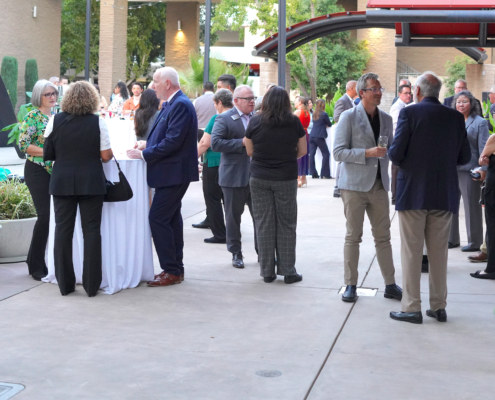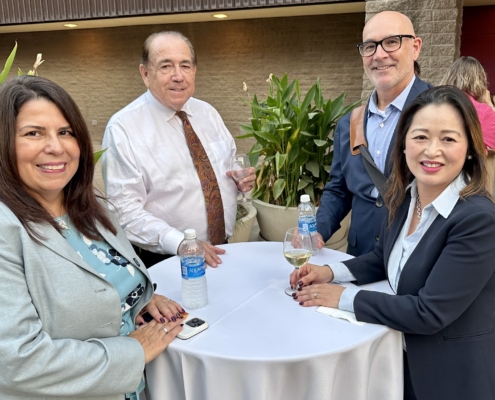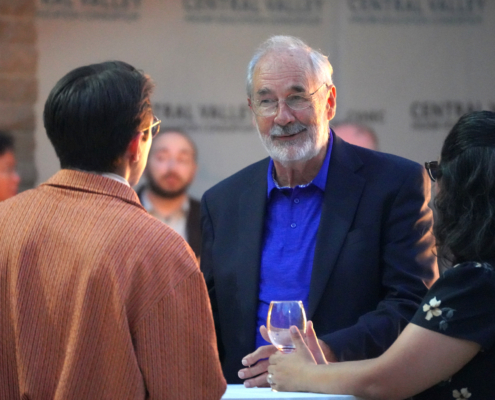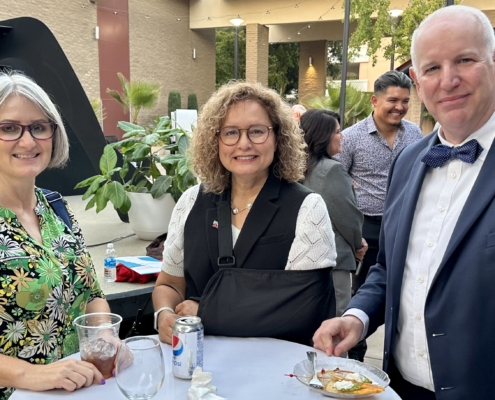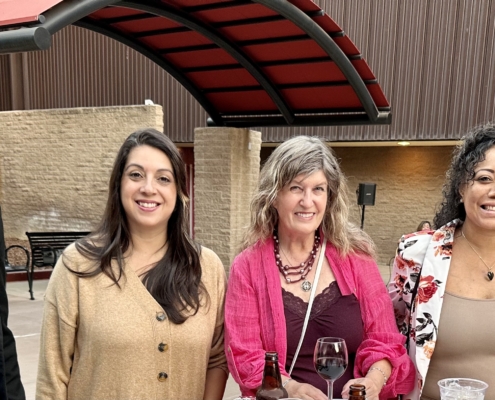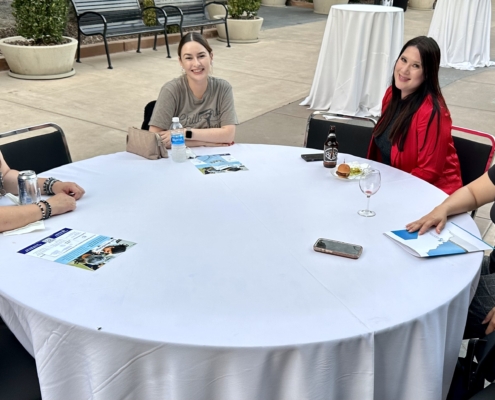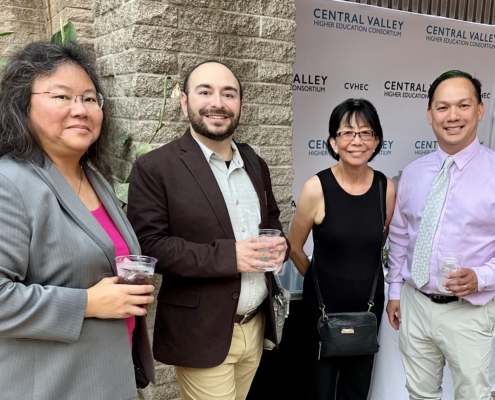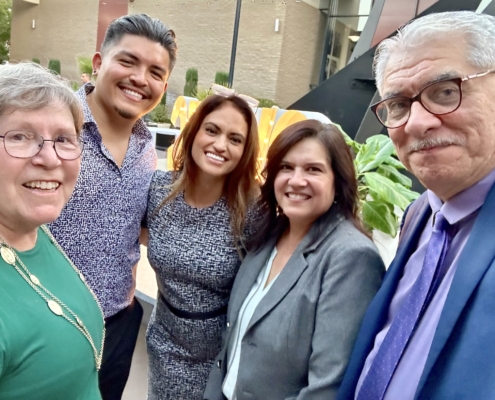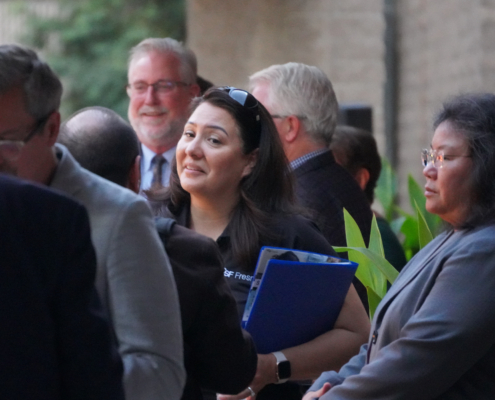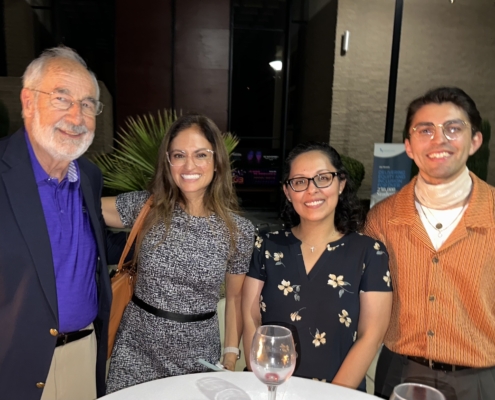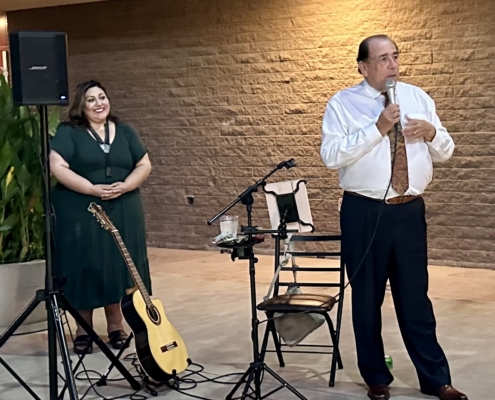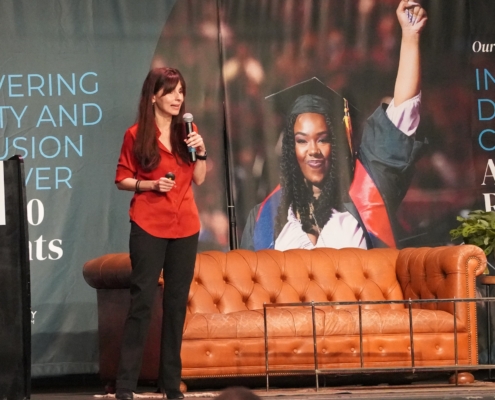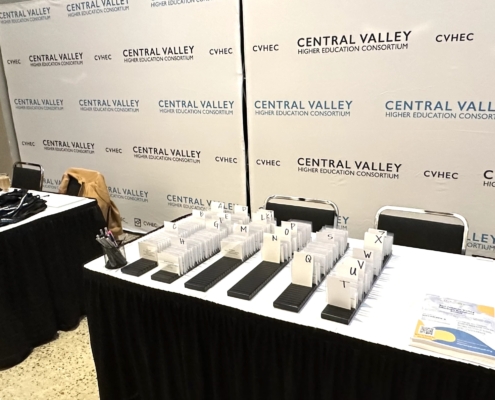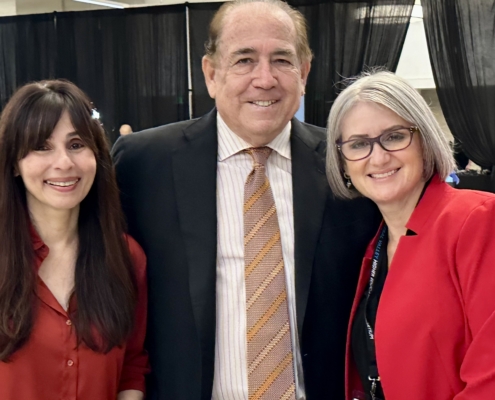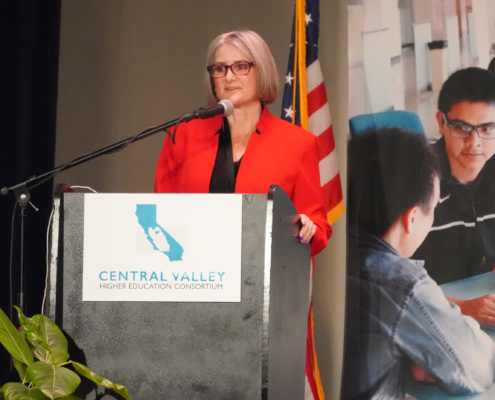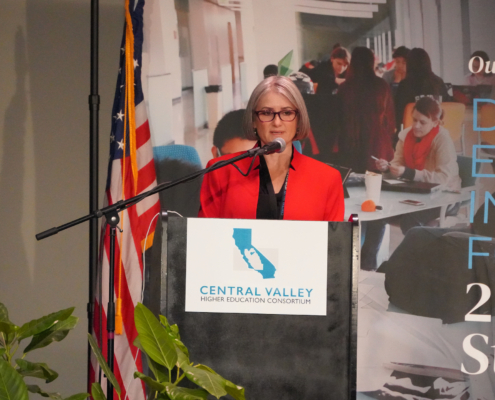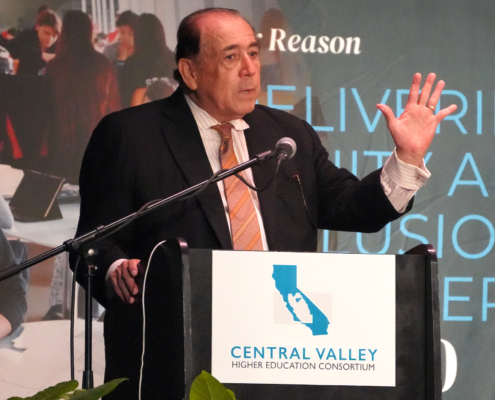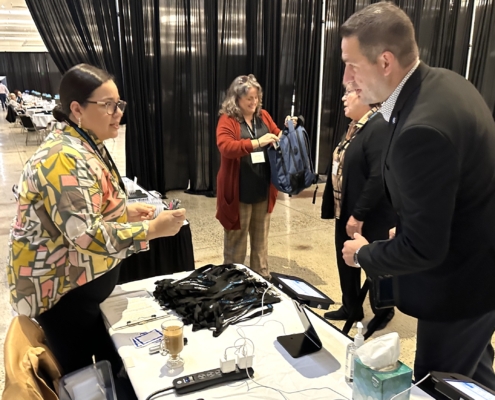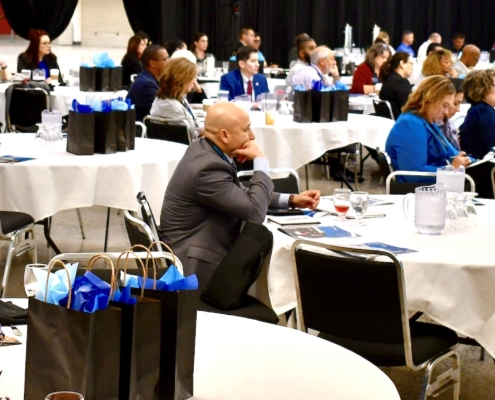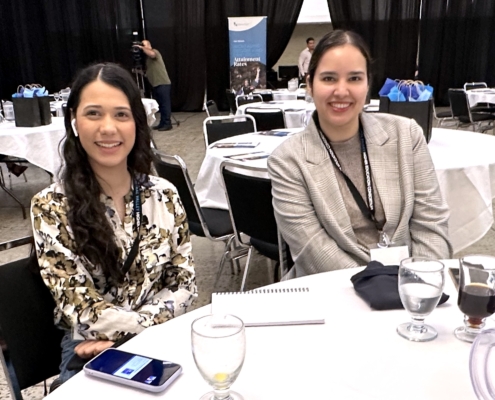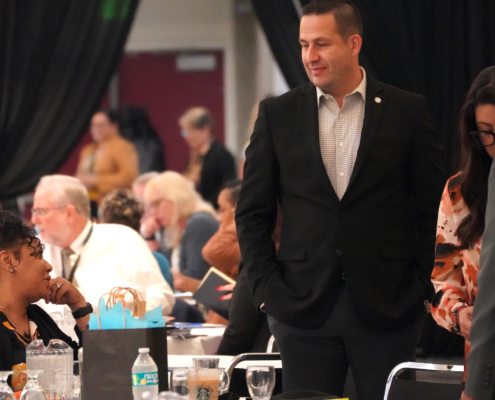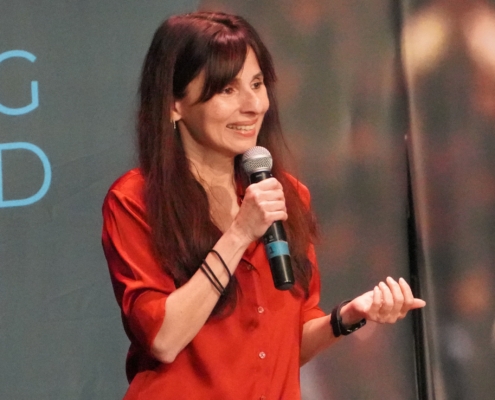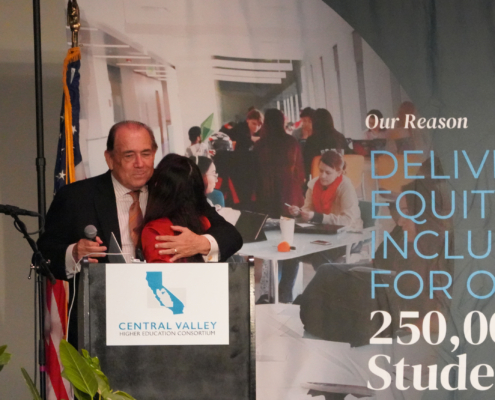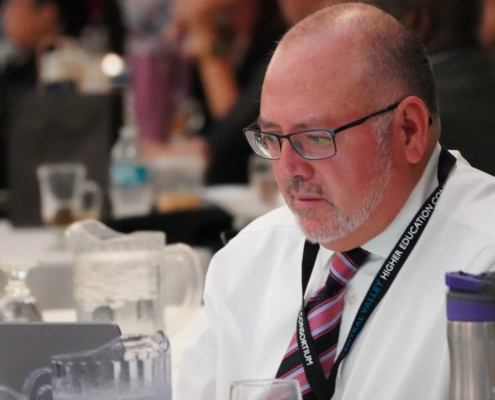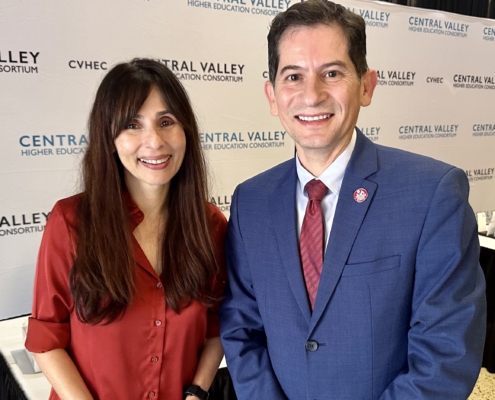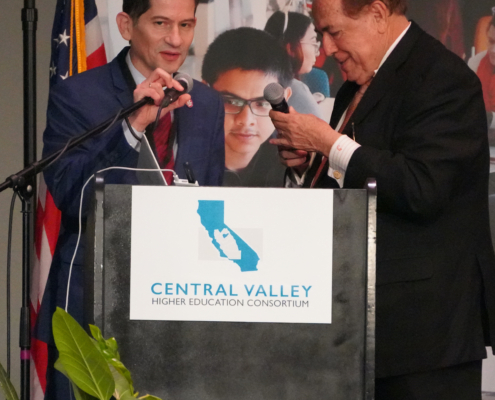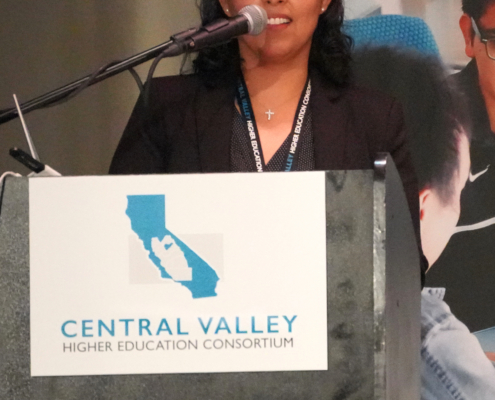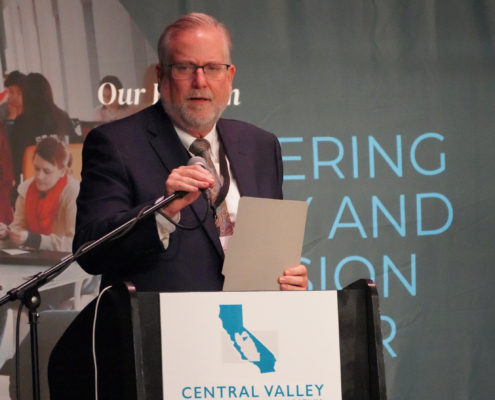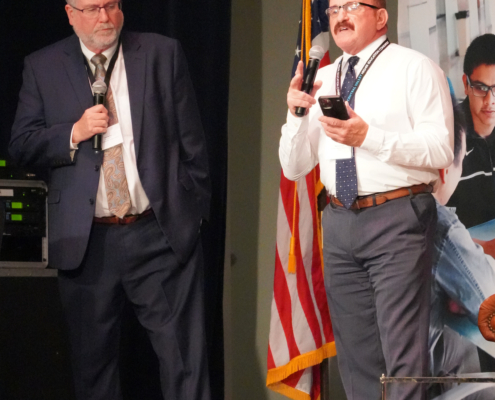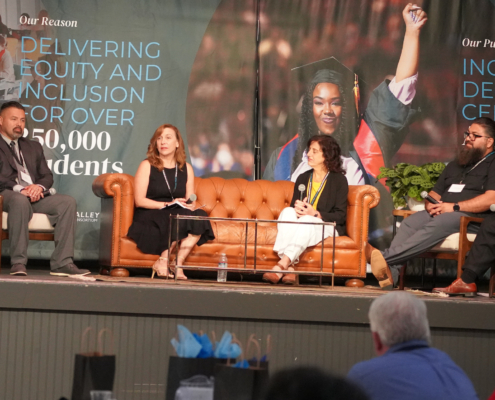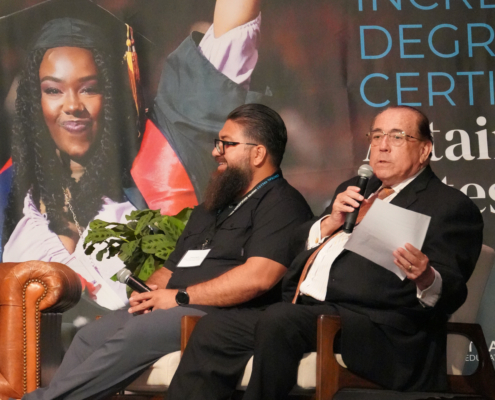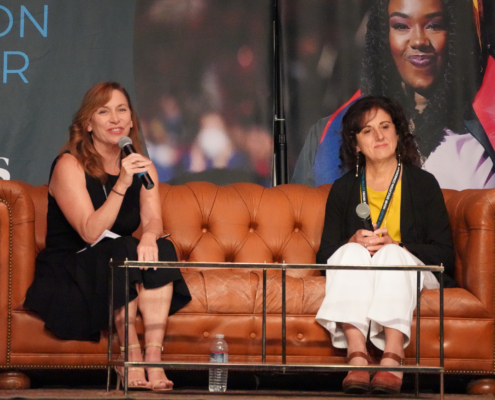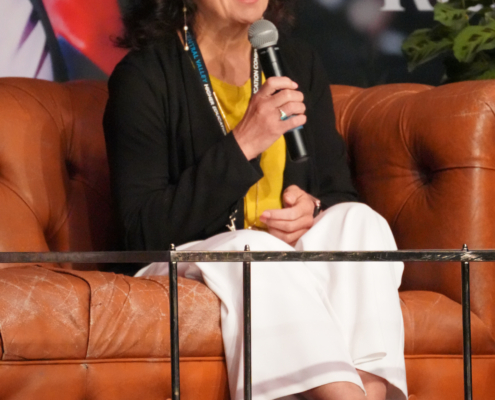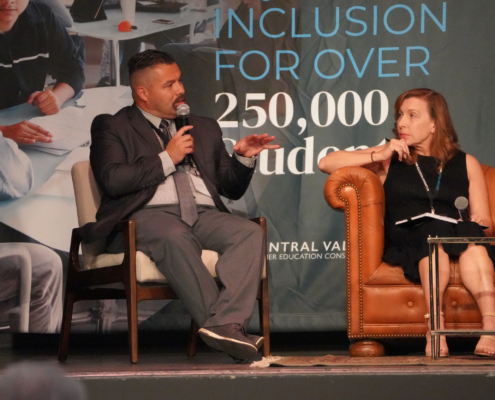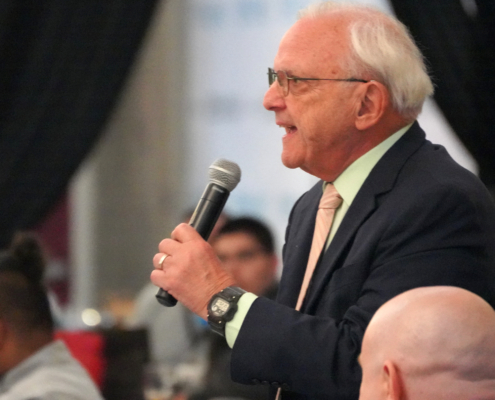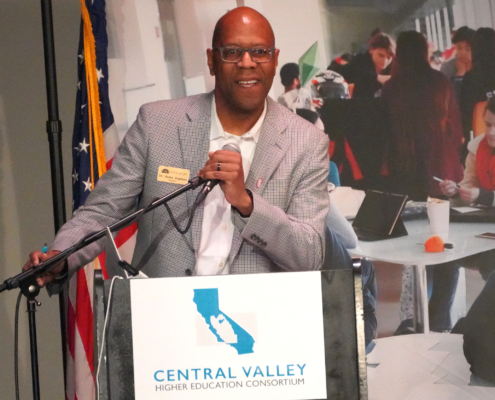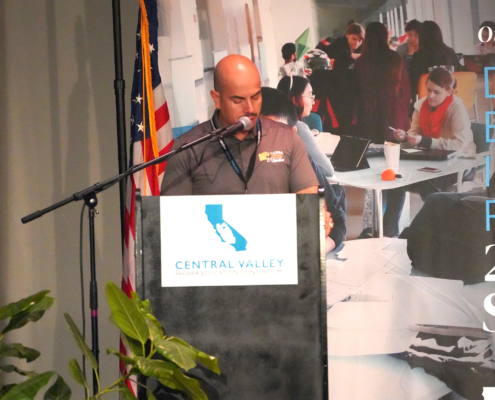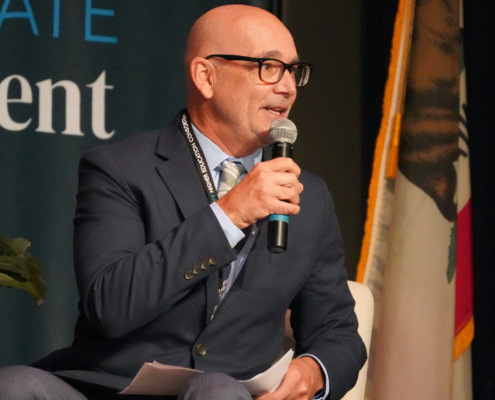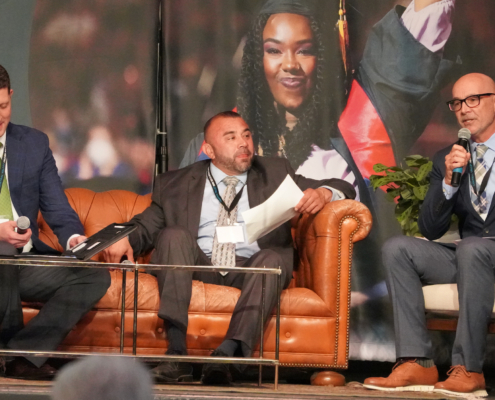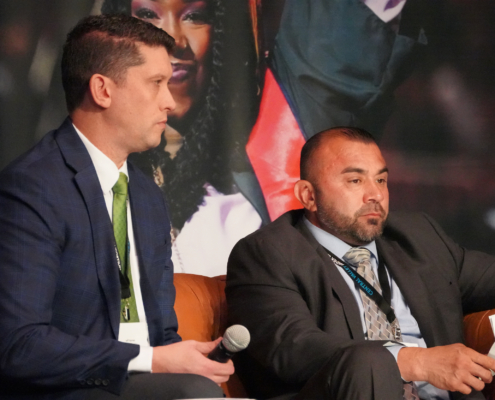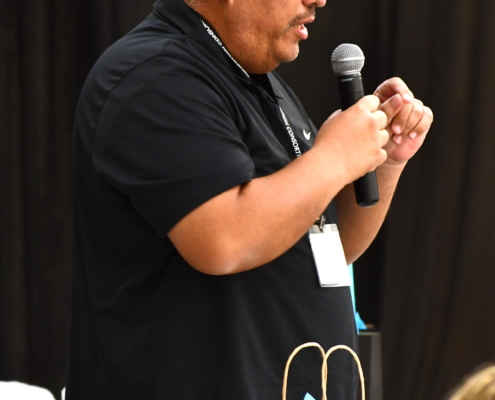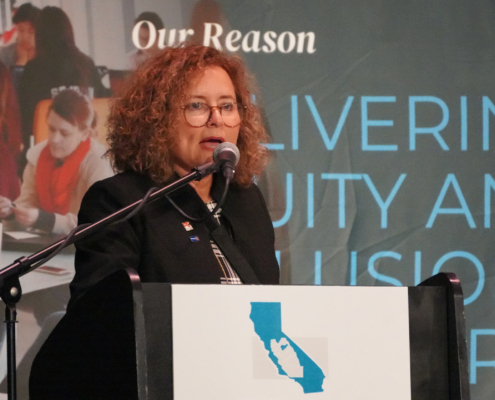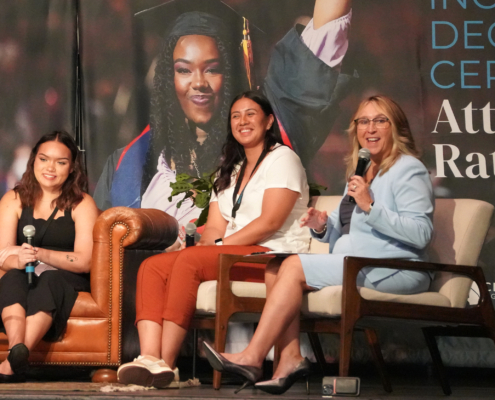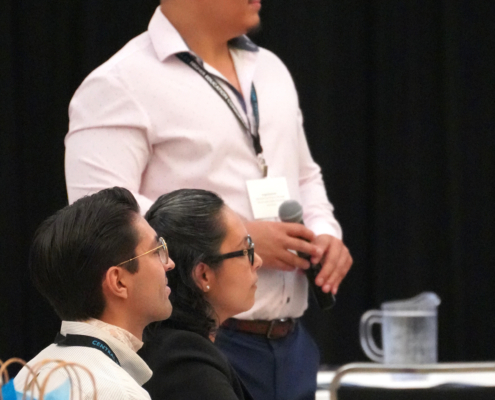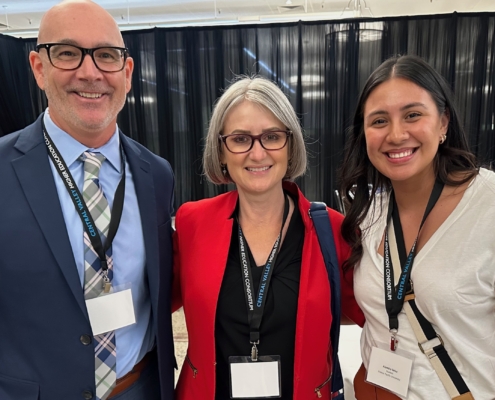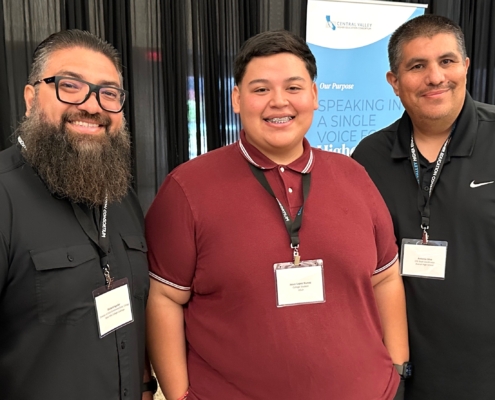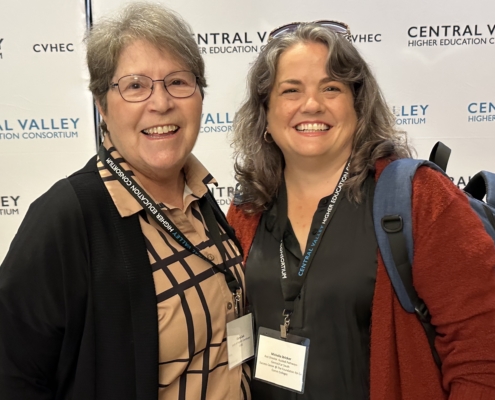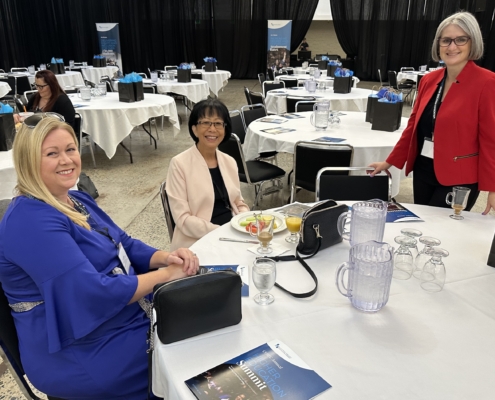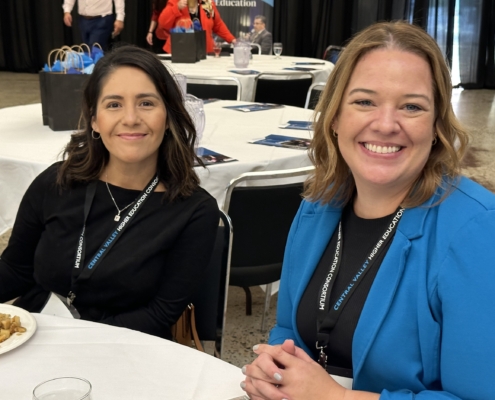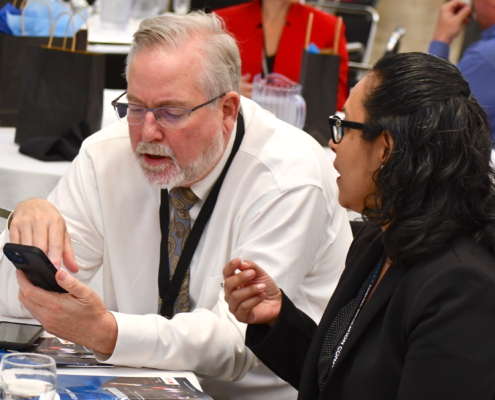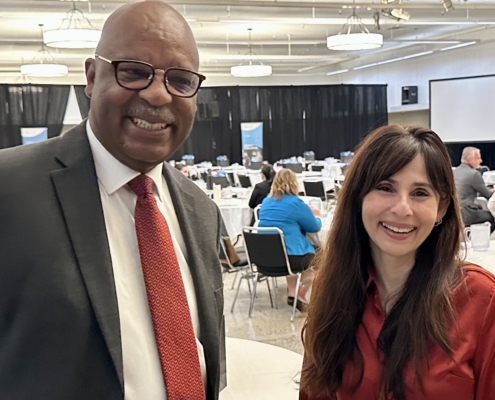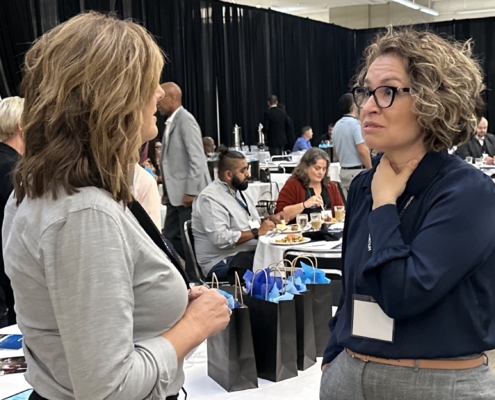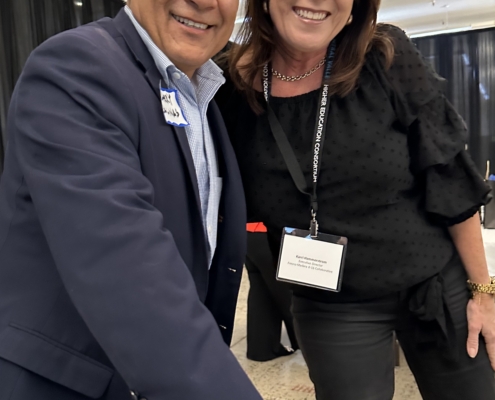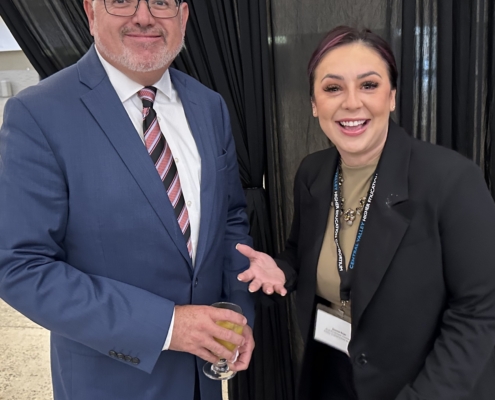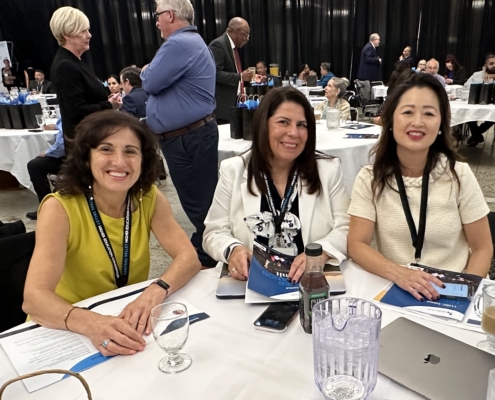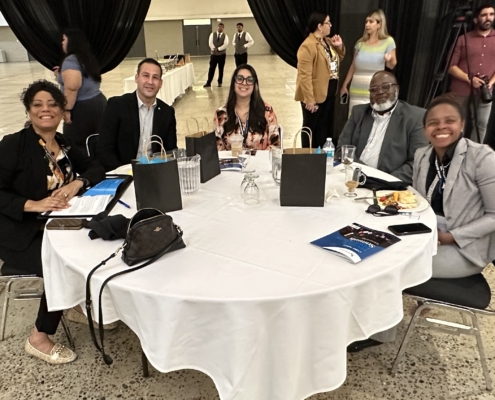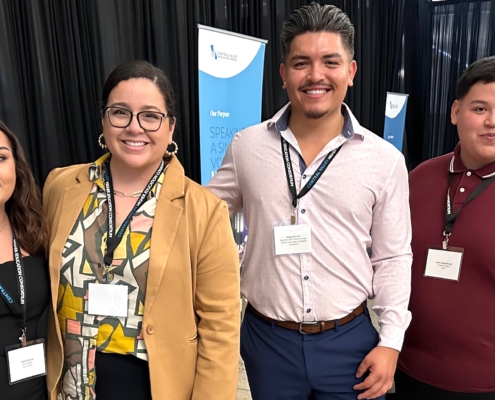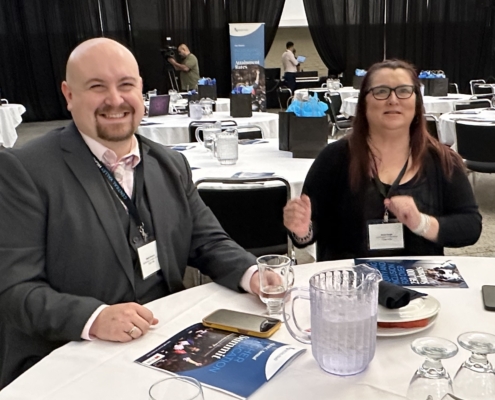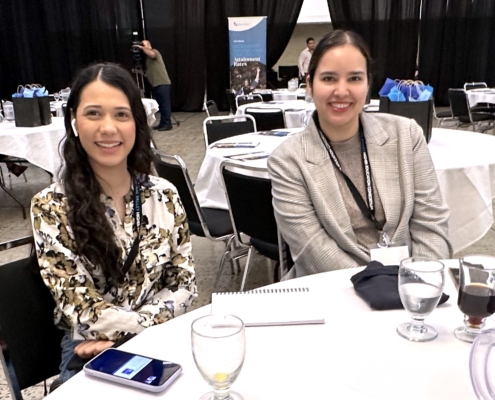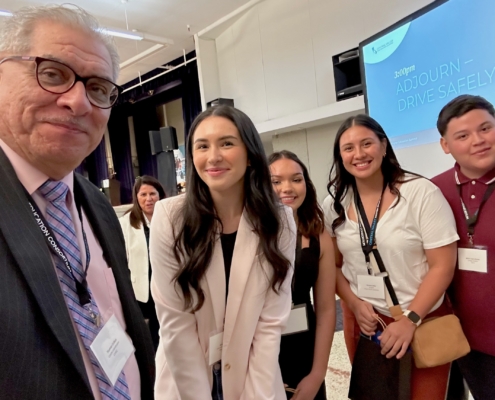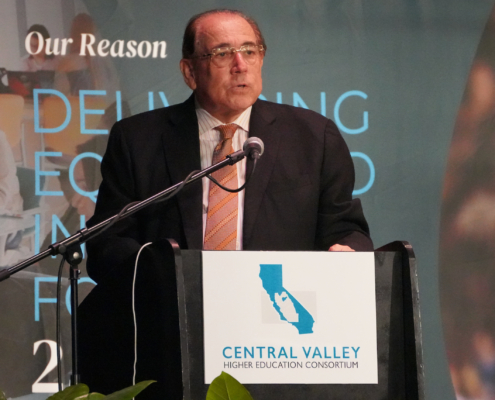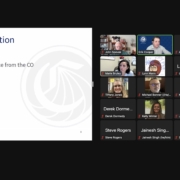AB1705 update: Math Task Force Convening draws state higher ed officials
Oct. 25: “The Central Valley Way to
AB 1705 Success and Beyond”
BY JOHN SPEVAK
Math and English Task Forces Coordinator – Central Valley Higher Education Consortium
With our Oct. 25 math gathering, “The Central Valley Way to AB 1705 Success and Beyond,” in Clovis a few weeks away, the Central Valley Higher Education Consortium presents our agenda for the day that includes a few new developments for the dedicated and persevering math educators of our Math Task Force who have been engaged in hearty discussions regarding implementation of AB 1705 the past year-plus for the benefit of our region’s students.
First a reminder for those who haven’t already, please register as soon as you reasonably can for the free convening, which I again have the honor of co-facilitating with Tammi Rice-Perez, Ed.D., of the Charles A. Dana Center (University of Texas at Austin).
And thank you to the 61 who to date have registered for this free event which will be from 9 a.m. to 3 p.m. at the Clovis Community College Herndon campus (390 W. Fir Ave. in Clovis) and includes breakfast (8 a.m.) and lunch.
The task force’s successful discourse has drawn great interest not only around our region but in the state and even nationally and we are pleased to announce that representatives of the California Community Colleges Chancellor’s Office and University of California Presidents Office will participate.
And, the task force has gained national math attention evidenced by the invitation for our three strand leaders to present about the “Central Valley Way to Math Success” collaboration at the annual conference of the American Mathematical Association of Two-Year Colleges (AMATYC) in Atlanta Nov. 14-17 though the Dana Center.
Making the trip will be Jeremy Brandl of Fresno City College and Shelley Getty of Taft College.
So, what do we have in store for this fourth in-person convening in this mission of math educators from CVHEC’s member community colleges and K-12 partners — in addition to great discussions along the way with significant time for sharing in the afternoon?
First, notice the title of our event — you’ll see something a little different this time around: “… and Beyond.”
Our primary focus remains AB 1705, but as our mission winds down, we will look ahead to our CVHEC Math Task Force continuing the collaboration energy that has effectively been established and maintaining this momentum for future math issues of common concern.
And, I understand that task force members will have developed the curricula for courses beginning in the fall of 2025 so there will be time to talk about and share curriculum ideas. But there will also be time for talking about delivering the curriculum, through innovative pedagogy and best teaching practices.
Additionally, our discussions have grown to include many guests/partners on the agenda from the state’s three segments of higher education as well as representatives from the California Mathematics Education Collaborative (CMEC) who will participate first by observing what we’re doing as well as sharing what they are doing in relation to teaching math and, in particular, to teaching STEM math.
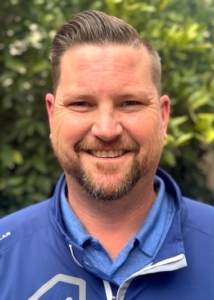
Jeremy Brandl – Fresno City College
The session will open with a general introduction acknowledging the state leaders who will participate:
- Dr. Erik Cooper, California Community College vice-chancellor will join us by Zoom to represent CCC Chancellor Sonya Christian;
- Rolin Moe, executive director of UC Online in the University of California Office of the President will make the trip to Clovis to represent UC President Michael V. Drake, M.D.
- FredUy, director of Systemwide California State University Education and Leadership Program;
- Ted Coe, vice president, Content Advocacy – Mathematics of Northwest Evaluation Association (NWEA), and a member of the California Mathematics Education Collaborative (CMEC).
At 9:30 a.m. for the Math Strand Report Outs, our three strand leaders will present and lead discussion on work undertaken with other Math Task Force members from throughout our 15 community college CVHEC members since our April 19 meeting – including ongoing strategizing over the summer – on three strands and discussion regarding Chancellor office guidance:
- Developing a single-course prerequisite to calculus – Jeremy Brandl, Fresno City College
- Developing a calculus course with a corequisite – Shelley Getty, Taft College
- Verifying single-course prerequisite – Nathan Cahoon, Taft College
- Profs concerned about C.O. guidelines – Tina Akers-Porter, Modesto Junior College
Vice Chancellor Cooper will take the virtual stage from 10:30 to 11 a.m. to present “Reflections from Chancellor’s Office.” He first joined us a year ago in our second session of what will now be seven AB1705 meetings by the Math Task Force since mid-2023.
Next, we will present the “Updates on Regional and State Math Innovations” segment with these topics:
- Innovation in Central Valley High Schools — College Bridge (5 mins)
- K-16 Collaborative Math Mentorship Program – Liz Rozell, CVHEC Kern Master’s Upskilling Program math faculty mentor coordinator (10 mins)
- UC-CCC Dual Enrollment: Enhancing Transfer Opportunities Through Online Collaboration” – Rolin Moe, UC Office of the President (20 mins)
- Update from CSU: Statewide Math Initiatives – Fred Uy, director of Systemwide CSU Education and Leadership Program (20 mins)
- Update from the California Mathematics Education Collaborative (CMEC): “What CMEC is Currently Doing” – Ted Coe, CMEC (10 mins)
Following a 40-minute lunch break, we will hear a discussion about “National Best Practices in Math Student Success,” by Joan Zoellner, M.A. and Dr. Rice-Perez, both from The Dana Center from 12:40-1:10 p.m.
The afternoon breakouts session, “Sharing, Discussion Primarily on Pedagogy and Data,” will follow up the three stand topics (above) led by the three strand leaders
Report-outs from the breakout sessions will be presented before the day wraps with the topic “Where do we go from Here? Setting the Date for Spring 2025” presented by Tammi and myself from 2:45 – 3 p.m.
This closing discussion will serve to bring our work on AB1705 to a close and begin looking to what lies ahead.
I am impressed with two observations about the past year and half of intense work by the Central Valley Math Task Force that I have mentioned before: I believe we are in the midst of a “math tsunami” in our state and our country. And we in the Central Valley are not only in it, but we are in many ways leading the way via “The Central Valley Way” to student math success.
Our Math Task Force members have been going above and beyond duty for the sake of students and their success so we are preparing for a good turnout Oct. 25. The more math brains involved, the better the outcomes.
Event questions: contact Ángel Ramírez, director of operations and finance, at angelr@csufresno.edu or 559.292.0576.
Media inquiries: Tom Uribes, text 559.348.3278 or cvheccommunications@mail.fresnostate.edu.
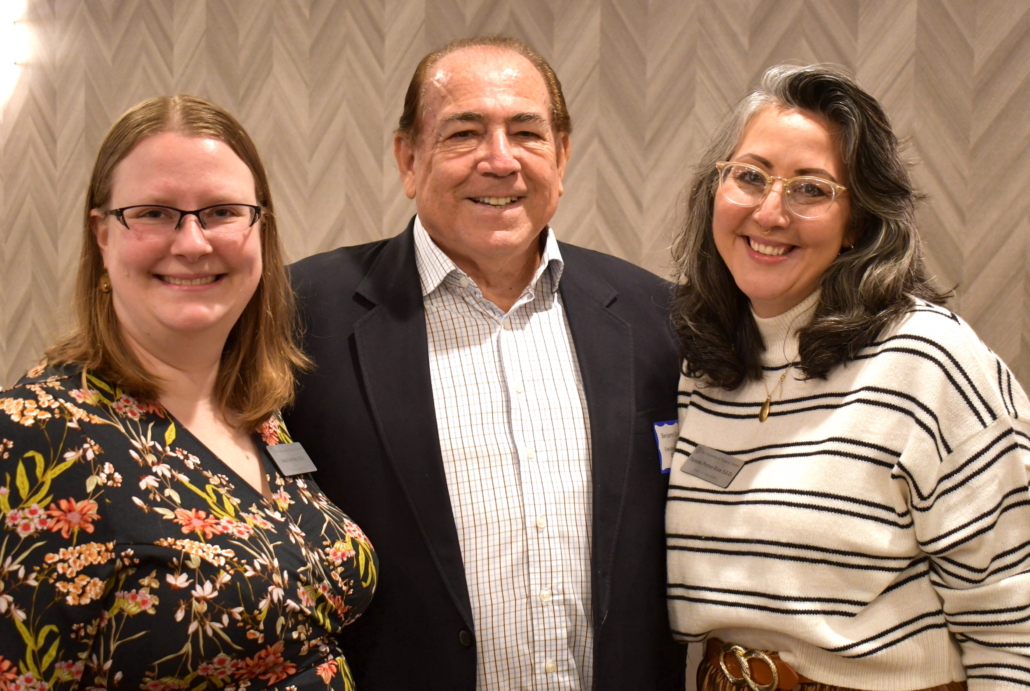
Joan Zoellner, M.A., and Dr. Tammi Rice-Perez, both from the Charles A. Dana Center (University of Texas at Austin), with Dr. Benjamín Durán, CVHEC executive director, at the first in-person MTF/AB1705 Convening last year.
Math Task Force continues AB 1705 work with April 19 convening
Secondary education voices invited to join discussion
Discussions to improve calculus pathways for STEM students amidst a pending deadline this summer continues with the third “Central Valley Way to AB1705 Success” Convening set for Friday, April 19 in Fresno that will also bring more secondary education voices to the table and a review of guidance issued by the California Community College Chancellors Office last month.
Registration is now open for the event in Fresno presented by the Central Valley Higher Education Consortium Math Task Force with the Charles A. Dana Center (University of Texas at Austin) from 9 a.m. to 3 p.m. at the DoubleTree by Hilton Hotel Fresno Convention Center, the site of two previous in-person convenings last fall and in January.
The event will re-convene community college math educators, administrators and institutional researchers working since the fall towards compliance with the final stage of AB1705: validation of equitable placement, support and completion practices for STEM programs.
Signed into law by Gov. Newsom in September 2022, AB 1705 is an amendment to the landmark legislation AB 705 (Irwin, 2017) which transformed placement and developmental education in the California Community Colleges. AB1705 supports full and comprehensive implementation by, among other requirements, specifying that colleges must demonstrate the benefit of transfer-level math preparatory courses for STEM Calculus 1 based on the following conditions:
- The student is highly unlikely to succeed in the first STEM calculus course without the additional transfer-level preparation.
- The enrollment will improve the student’s probability of completing the first STEM calculus course.
- The enrollment will improve the student’s persistence to and completion of the second calculus course in the STEM program, if a second calculus course is required.
From now until July 1, colleges have the opportunity to validate that their preparatory courses meet the aforementioned AB 1705 standards.
Since passage, the state’s community colleges have worked towards compliance of various aspects of AB1705 including 19 Central Valley community college members of CVHEC through representatives serving on the consortium’s Math Task Force consisting of math faculty and administrators.
The task force has held several virtual and in-person work sessions since October designed to collaborate in unity for compliance. At the last convening Jan. 26, more than 82 math and administrative representatives from the community colleges — including several campus research professionals — and one high school principal met with the task force to explore five strands of curriculum planning:
- Validating Prerequisites;
- Designing Precalculus for 2025;
- Math Support Outside and Inside the Classroom;
- Building an AB 1705 Campus Team; and
- Guided Self-Placement.
Since the Jan. 26 meeting, the strand leads have been preparing summaries of their breakout discussions held that day, said Dr. John Spevak, CVHEC regional coordinator who oversees the consortium’s Math Task Force.
Member college teams are also preparing summaries of the tentative plans they developed in the afternoon breakout sessions for oral reports. Additionally, the workgroups have been meeting and will report out on their progress in April regarding the strands.
A good portion of the April 19 meeting will be devoted to the data collection underway by CVHEC community college research professionals related to student success in math, part of the valleywide Data Collection Project under development by the consortium, said Spevak, who will again co-facilitate the April event with Dana Center colleague Dr. Tammi Perez-Rice.
Secondary ed voices
This next convening will also include representatives of K-12 school districts, including several high school principals who have already worked with CVHEC through the Central Valley Math Bridge Program.
“It’s important to bring into the conversation high school leaders and our colleagues who care as much about the future math success of students as community college math educators do,” said Dr. Benjamín Durán, CVHEC executive director.
That conversation was begun at the January convening of community college math professors and administrators when Marlena Celaya, principal of Orosi High School and former high school math teacher, told the group that Central Valley high school educators would very much like to participate in future discussions about math success for Central Valley students.
Spevak said this development will also foster additional learning about the high school math landscape as it pertains to college readiness.
Any Central Valley secondary education officials interested in attending the April 19 convening are welcome, he added.
CCC ‘validation memo’
Also up for discussion will be a Feb. 27 validation memorandum by the California Community College Chancellors Office entitled AB 1705 Validation of Equitable Placement, Support and Completion Practices for STEM Programs.
The Chancellor’s Office also presented a webinar March 4 to further discuss the details of this guidance and address questions.
The Dana Center and CVHEC teams are presently reviewing the CCC memo to provide analysis that will help guide the Math Task Force’s five strands committees and will be presenting its memo assessment in the coming weeks, said Joan Zoellner, M.A., who is the lead for the Dana Center’s Launch Years Initiative;
In a preliminary review of the memo, Zoellner noted that while the CCC memo provides direction on the validation process for transfer level math placement and enrollment practices for STEM programs, it indicates that no more than one transfer-level prerequisite shall be offered prior to calculus.
“The options for that prerequisite course are limited by the memo and validation options as well,” Zoellner said.
She recommended that consortium community colleges review the chancellor’s office memo and some of the findings presented to determine how it affects their respective campus.
“If possible, work with your IR department to confirm those numbers and results prior to the April 19 convening,” Zoellner advises.
For more info: centralvalleyhec@gmail.com
For media inquiries: Tom Uribes – cvheccommunications@mail.fresnostate.edu (or text 559.348.3278).
See also:
- CCCCO Memo Feb. 27, 2024: AB 1705 Validation of Equitable Placement, Support and Completion Practices for STEM Programs
- CVHEC Math Task Force
- What is AB 705 and AB 1705?
- WHAT THE CV-HEC IS HAPPENING BLOG (October 2022): AB 1705 – What Does It Do?
- CCC Memos and Resources
- https://bit.ly/MTFconveneKSEE24
- Valley’s math ed experts unite to address AB 1705 challenge for student success
- The CVHEC Way to Math Success — Implementing AB1705
- Math Task Force begins discussion of AB1705 implementation – Nov. 17 next
CVHEC Math Task Force meets in-person Oct. 13 for AB 1705 follow-up - NEWS RELEASE – CVHEC Math Task Force: Impactful legislation (AB 1705) Convenings Oct. 6 & 13
- CVHEC Website Feature: Math Task Force Page
MATH TASK FORCE: ‘Something extraordinary’ (Jan. 26 wrap)
Modesto Junior College math professor Tina Akers-Porter discusses her strand group’s deliberations at “The Central Valley Way to AB1705 Success” Convening Jan. 26 where a call for a “principals task force” by Orosi High School Principal Marlena Celaya would bring more secondary education voices to the table.
‘Something extraordinary is happening in math in California’s Central Valley’
Math Task Force latest AB1705 session leads to calls
for more data, high school input, re-convene April 19
BY TOM URIBES
CVHEC Media/Communications Coordinator
Realizing that state guidance surrounding Assembly Bill 1705 remains elusive, valley community college math educators and officials forged ahead at “The Central Valley Way to AB1705 Success” convening Jan. 26 in Fresno with a determined and unified mindset to develop implementation plans that will serve the best interests of their students including a follow-up session set for April.
In addition, the Central Valley Higher Education Consortium (CVHEC) Math Task Force discussion centered around five strands of curriculum planning for implementation before the law goes into effect July 1, two aspects emerged at the lively day-long work session: the increased participation of institutional researchers for pertinent data-collecting and a call for a “principal’s task force” to bring upper secondary education voices to the table.
Presented by CVHEC, the convening — the latest in a series of deliberations since fall — was attended by 82 representatives from the consortium’s 19-member community colleges, one high school principal and campus research professionals.
They agreed to reconvene April 19 for reports on follow-up work that will occur as a result of this most recent event. Registration for that event will open next month with additional details forthcoming.
Facilitated by the Charles A. Dana Center at the University of Texas at Austin, the session last month reviewed five strands of curriculum planning: Validating Prerequisites; Designing Precalculus for 2025; Math Support Outside and Inside the Classroom; Building an AB 1705 Campus Team; and Guided Self-Placement.
“With tensions high and little guidance surrounding AB1705, the 19 community colleges and districts that comprise the CVHEC nine-county region are rolling up their sleeves and getting to work on this math movement the ‘Central Valley Way’,” summarized Tammi Perez-Rice of the Dana Center.
Perez-Rice, who co-facilitated the event, said the convening was solely dedicated to working and planning at a regional and institutional level in two parts. The first part was dedicated to expanding the five work groups that emerged from the Nov. 17 webinar and creating a plan to move forward. The second half of the convening was devoted to institutional planning.
“The fruits produced from these convenings are already being felt around the region,” Perez-Rice said. “The plans and implementations emerging from these convenings are more than just a response to AB705 and AB1705; they cultivate systemic reforms that will benefit all students in the CVHEC region and beyond.”
John Spevak, CVHEC regional coordinator who oversees the consortium’s Math Task Force and co-facilitator of the Jan. 26 gathering, said in the short-term, the five strands work groups will continue to communicate and provide updates in preparation for the April 19 convening. The strand leads are preparing summaries of their Jan. 26 breakout discussions and member college teams are preparing summaries of the tentative plans they developed in the afternoon breakout sessions for oral reports in April.
“In the longer term, our Math Task Force will continue to monitor what the California Community College Chancellor’s Office says, while mainly going forward with our own Central Valley approach to the five strands.”
That “Central Valley Way” stems from the work undertaken by the CVHEC Math task Force, first formed in 2019, in the past year that was intensified with four work sessions beginning Oct. 6 in a virtual convening with CCC vice-chancellor Eric Cooper. The first in-person session followed Oct. 13 in Fresno and another virtual session was held in two parts Nov. 17 before the Jan. 26 session.
These sessions may represent the only concerted effort by a region’s community college math community actively meeting to collaborate across campus boundaries for ways to unite as one voice and determine a curriculum course of action that meets the law’s intent, Spevak said.
“We at CVHEC, along with the Dana Center representatives and our College Bridge partners in the Math Bridge Program, feel that something extraordinary is happening in math in the Central Valley of California,” Spevak said.
After the Jan. 26 session ended, Perez-Rice reiterated a point she made the first time she visited Fresno for the first in-person convening last fall:
“This collaboration today was amazing. As I travel and talk to math faculty all over the country, what I see pulsating from the CVHEC community here in Central California is just compassion; caring about their students; putting their students first; understanding what their students need; and more importantly collaborating with each other working across institutions to make things happen.”
Inviting secondary ed voices to ‘align syllabi’
A key development of the convening was the assertion and agreement that a crucial next step is “to involve high schools in the discussion and determine how to breakdown barriers between systems for a cohesive collaborative effort to put students first across the state of California,” a message delivered by Marlena Celaya, principal of Orosi High School who was the only secondary education official in attendance.
Celaya’s comments, first in a strand session and later in general comments before the assembled group, resonated with the community college professionals as she offered to lead a task force of principals/administrators who would unify with the CVHEC community college math educators for implementation strategy — to listen and hear what the needs are and how to meet those needs.
“I’m willing to lead this work because I don’t want people to go through the wars I went through teaching algebra and volunteering all my time,” said Celaya, a former math teacher at Dinuba High School. “We would want to hear from community colleges and say to them ‘what do you need?’
“We heard something from you today: ‘I want to know what courses are offered at the high school and what does that course description look like?’ Aligning syllabi is what I’d like to do,” Celaya said. “Mathematics is my passion.”
Perez-Rice said the April 19 convening promises more high school representation, with over twelve principals who are part of the Math Bridge Program by CVHEC and College Bridge being invited. Other secondary education officials from throughout the valley are welcome she said.
Participant feedback: ‘great to see we’re not alone in this …’
After the event, several participants shared their assessment of the Jan. 26 convening.
“The conversations were amazing and we really appreciated being here,” said Joshua Lewis, chair of the Bakersfield College Mathematics Dept.
“There have been so many legislative changes and so many unknowns it’s nice to see the work that other campuses are doing and realize that we’re not alone, that we have shared values; that we have shared emphasis on student learning and really care about doing right by all of our students,” he added.
Nathan Cahoon, Taft college math professor, felt that the efforts of CVHEC’s Math Task Force as exhibited at the convening is strengthening the voice of the valley’s math community which will have an impact.
“It was amazing to work with incredible professionals who have some really amazing ideas,” he said. “I know I took many good notes about ideas to implement at our college. The connections we are building here with each other will be powerful down the road as we build a cohesive effort to get some good research together that we can send to the state as one voice from all the colleges.”
Modesto Junior College math professor Marina Hernandez said coming together within the region is relished because when attending other statewide or national conferences, the focus is not as localized.
“It was very helpful to learn what other colleges in the Central Valley are doing because we share similar student population and resources characteristics and their best practices are applicable to us here in our region,” Hernandez said.
Tina Akers-Porter, Modesto Junior College math professor, said the Math Task Force work has helped her better understand what AB1705 is and what it means for her students.
“I feel like I have a better understanding of some of the challenges of the legislation and what others are worried about,” she said. “We share some of those worries but it’s great to hear different points of view on that. A byproduct of this is we are seeing how we need to support underprepared students more, inside and outside the classroom, and sharing ideas to do that.”
Shelly Getty, Taft college math faculty and a strand leader, echoed Akers-Porter: “We left knowing we are going to start some specific tutoring and targeting students for tutoring. We will try to advertise it better and recruit so students get more access to the services we already provide which will greatly impact them. We shared some good ideas on how to do that effectively.”
Marissa Martinez, Taft college math professor, said, “We have our work cut out for us. There’s a lot of things that we have to address with a lot of moving parts. Everything keeps changing but it was great to be able to see that we’re not alone in this, that we’re working together to better serve our students.”
She said this intercollegial collaboration and the feedback from the colleges helps “so we don’t have to reinvent the wheel — what worked, what didn’t work.”
Next steps? Data research
“I would say the next step is collecting our data to see how the numbers show where we are so we can prove that these courses are important for our student success,” Martinez said.
This data aspect was also a key part of the convening as institutional research professionals were invited and directly participated such as Arooj Rizvi, research analyst in the Office of Institutional research and Effectiveness at San Joaquin Delta College.
“Researchers have a monumental role in the implementation of AB 1705 because policymakers are going to depend a lot on what we are able to produce as a group or even as an institution,” Rizvi said. “Being a part of these conversations helps us to see the bigger picture, the context and the requirements of what exactly it is that we are looking for in the data.”
She said it was exciting to hear at the convening what area colleges are going through.
“I realized how similar our challenges are from institution to institution, “she said. “Working through that together and being solution-oriented is something that’s going to take all of us towards a beneficial direction. Seeing us all here today was a defining moment in history.”
Owynn Lancaster, vice president of academic strategy for CVHEC partner College Bridge, said the event was “a huge success seeing folks come together from math to talk about math and really pool their resources to address actual challenges.
“The most powerful focus of change in education is always the educator,” Lancaster said. “I know everything’s heaped on them but in a lot of ways they have the greatest power of the greatest agency for this.”
For more info: centralvalleyhec@gmail.com
For CVHEC media inquiries: Tom Uribes – cvheccommunications@mail.fresnostate.edu (or text 559.348.3278).
See also:
https://bit.ly/MTFconveneKSEE24
Valley’s math ed experts unite to address AB 1705 challenge for student success
The CVHEC Way to Math Success — Implementing AB1705
Math Task Force begins discussion of AB1705 implementation – Nov. 17 next
CVHEC Math Task Force meets in-person Oct. 13 for AB 1705 follow-up
NEWS RELEASE – CVHEC Math Task Force: Impactful legislation (AB 1705) Convenings Oct. 6 & 13
CVHEC Website Feature: Math Task Force Page
PHOTO GALLERY
CVHEC SPOTLIGHT: Consortium at national DREAM Conference with CVCF
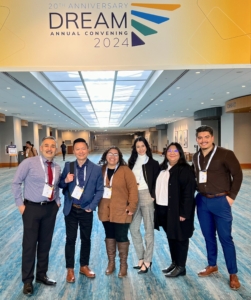
Ángel Ramírez (right) represented CVHEC in the Central Valley Community Foundation delegation of area leaders attending the Achieving the Dream Conference in Orlando Feb. 19-22 (from left): Carlos Castillo; Phong Yang; Estefania Avalos Chavez; Vianey Barraza Chavez; Julie Vue; Ángel. Not in picture: SCCCD Chancellor Carole Goldsmith.
The Central Valley Higher Education Consortium is participating this week in the 20th anniversary convening of DREAM, which brings together thousands of practitioners from hundreds of colleges “to exchange evidence-based approaches to accelerating student success in a manner that champions equity and drives economic vibrancy.”
Ángel Ramírez, director of operations and finance, is representing CVHEC in the Central Valley Community Foundation delegation of area leaders led by Julie Vue, CVCF senior program officer, attending the four-day event in Orlando, Florida
Other CVCF delegation representatives are Carlos Castillo, chief of Diversity, Equity, and Inclusion at Fresno Unified School District; Phong Yang, associate vice president for Strategic Enrollment Management at Fresno State; Estefania Avalos Chavez, board member, Higher Education For All; Vianey Barraza Chavez, director of Education Programs and Special Projects for the Education and Leadership Foundation; and Dr. Carole Goldsmith, State Center Community College District chancellor who also led a SCCCD delegation to the conference.
The conference is presented by Achieving the Dream, a national organization of more than 300 community colleges across the country partnering to build customized growth plans to address the unique challenges each institution faces.
It embodies Achieving the Dream’s longstanding belief in advancing community colleges as accessible hubs of learning, credentialing and social mobility that eliminate inequities in students’ educational and workforce outcomes.
Through plenary sessions with critically acclaimed scholars, educators, and activists and breakout sessions with higher education thought leaders at the Orlando gathering, a nationwide network of colleagues are sharing 20 years’ worth of lessons learned in the student success field and promoting a vision of higher education as an engine for equity and a catalyst for community transformation.
The Central Valley Community Foundation, the only accredited community foundation in the region, drives strategic investments and offers best-in-class charitable tools to connect donors to the causes they care most about with $140 Million in assets under management.
Valley’s math ed experts unite to address AB 1705 challenge for student success
Math Task Force Convening Jan. 26:
‘Central Valley Way To AB1705 Success’
With the agenda released this week, over 60 Central Valley math education experts will convene in Fresno Jan. 26 to plan math pathways for student success as they brainstorm within five strands of implementation around Assembly Bill 1705 that goes into effect this summer.
The Central Valley Higher Education Consortium’s “Central Valley Way To AB1705 Success” Convening from 9 a.m. – 3 p.m. at the DoubleTree by Hilton Hotel Fresno Convention Center, will bring together community college math educators, administrators and institutional researchers.
Presented by the CVHEC Math Task Force and facilitated by the Charles A. Dana Center at the University of Texas at Austin, the convening is free with advance registration and includes lunch.
Discussion for the historic convening — with administrators and IR experts joining in the conversation — will center around five strands that the region’s community college math academicians can undertake for student success when the new law goes into effect July 1: Validating Prerequisites; Designing Precalculus for 2025; Math Support Outside and Inside the Classroom; Building an AB 1705 Campus Team; and Guided Self-Placement.
Five Math Task Force members serving as strand leads are: Jeremy Brandl, Fresno City College math professor; Nathan Cahoon and Shelley Getty, both Taft College math professors; Marie Bruley, Merced College dean of Science, Technology, Engineering, and Math (STEM); and Jay Thomas, West Hills College Lemoore math professor.
After the event opens with a welcome and brief introductions, the strand subcommittees open the discussion by presenting reports regarding preliminary strand deliberations over the past few months that started at three meetings the Math Task Force held in the fall.
Participants will then break into tabletop talks for feedback and to brainstorm new ideas, a timeline and next steps followed by report outs of those subcommittee sessions.
Following lunch, the participants will break into their respective college teams to discuss “Preliminary College Plans” in two parts: “Validating Prerequisites Between Now and July 1, 2024;” and “Developing New/Revised Curriculum to Take Effect July 1, 2025.”
“College Team Report Outs” will follow before the final session “Where Do We Go From Here?” looks towards the future and the role of Math Task Force sub-committees, college teams and CVHEC.
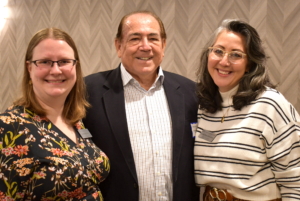
Dr. Benjamín Durán of CVHEC with Dana Center reps Joan Zoellner and Tammi Perez-Rice at the Oct. 13 Math Task Force convening in Fresno.
Dr. Benjamín Durán, CVHEC executive director, said, “We are proud that our Central Valley community colleges are leaning in on the expertise of their own math experts to figure out the best way to support our students within the guidelines of the legislation.”
AB 1705 — passed in 2022 for implementation July 1, 2024 — expands the provisions established in AB 705 (2017) by explicitly requiring community colleges not only to place students directly into transfer-level English and math courses but also to ensure that students actually enroll in those courses.
The legislation also establishes that for students who need or desire extra academic support, community colleges shall provide access to such support. The new law clarifies that a community college can require students to enroll in additional concurrent support if it is determined that the support will increase the student’s likelihood of passing transfer-level English or math.
Community colleges have been tasked with ensuring they comply with both AB705 and AB1705 designed to strengthen support for student success and increase degree completion.
CVHEC helped start the conversation by bringing together its Math Task Force — made up of representatives from CVHEC community colleges — and other math educators to discuss ideas and options regarding implementation within the Central Valley community college mathematics community last fall.
In three virtual sessions and one in-person convening in 2023, the Math Task Force created a collaborative “Central Valley Approach” to each, said Dr. John Spevak, CVHEC regional coordinator who oversees the consortium’s Math and English Task Forces.
“Now, for the January session, administrators and researchers are joining the Math Task Force to develop data-driven and college-endorsed solutions that help meet the challenge head on and in unity for the best interests of students.”
The fall inaugural sessions were facilitated by two Dana Center representatives who will return to Fresno for the Jan. 26 convening: Joan Zoellner, M.A., who is the lead for the Dana Center’s Launch Years Initiative; and Dr. Tammi Perez-Rice, Postsecondary Course Program specialist.
Dr. Erik Cooper, assistant vice chancellor of the California Community College Chancellor’s Office Cooper, also participated in the first virtual session to discuss the recent history of math education reform in California and answer questions as well as present the CCCCO’s AB 1705 Implementation Guide and FAQ webpage.
“With the passage of AB 705 then later 1705 – all designed to strengthen support for student success – CVHEC has been moving full steam ahead in assuring that our member colleges and their feeder high schools have a good understanding of the seemingly turbulent waters of the legislation,” Durán said.
Strand breakdown:
- Validating prerequisites — quantitative and qualitative: creating a Central Valley collaborative approach which would help make a strong case with the state. Point person: NATHAN CAHOON, Taft College math professor.
- Designing Precalculus for 2025: An effective single-course prerequisite for Calculus 1 (especially valuable if the state allows in 2025-26 only one prerequisite course for Calculus 1). Point person: JEREMY BRANDL, Fresno City College math professor.
- Math support outside and inside the classroom: What’s working best in the Central Valley, including math lab centers, tutoring, embedded tutoring, supplemental instruction, etc. Point person: SHELLEY GETTY, Taft College math professor.
- Building an AB 1705 campus team: Who needs to be on the team? Math and English professors, IR/IT staff, counselors, administrators, etc. How does it best function? Point person: MARIE BRULEY, Merced College dean of Science, Technology, Engineering, and Math (STEM).
- Guided self-placement: Helping ensure with the best possible questionnaire that students are taking the right math class when they start college. Point person: JAY THOMAS, West Hills College Lemoore math professor.
(Links to recordings of the two previous sessions are available below).
REGISTER – “The CVHEC Way to Math Success — Implementing AB1705” (Jan. 26, 2024)
EVENT AGENDA For questions: centralvalleyhec@gmail.com.
For media inquiries: Tom Uribes 559.348.3278 (text msg) or cvheccommunications@mail.fresnostate.edu
SEE:
- Previous sessions recordings:
CVHEC “AB1705 in the Central Valley” Webinar with Dr. Erik Cooper Oct. 6, 2023
MTF meeting Nov. 17 (10 a.m. session)
MTF meeting Nov. 17 (1 p.m. session)
- Coverage of the fall sessions:
Math Task Force begins discussion of AB1705 implementation – Nov. 17 next (with Oct. 13 photo gallery).
CVHEC Math Task Force meets in-person Oct. 13 for AB 1705 follow-up
NEWS RELEASE – CVHEC Math Task Force: Impactful legislation (AB 1705) Convenings Oct. 6 & 13
- The CCCCO’s AB 1705 Implementation Guideand FAQ webpage.
- The CVHEC Math Task Force
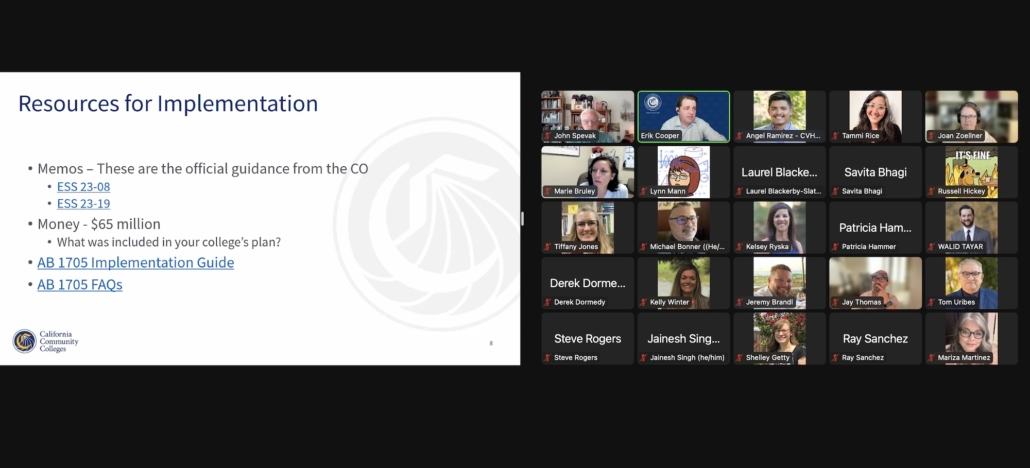
Dr. Erik Cooper of the California Community Colleges Chancellor’s Office zoomed into the Oct. 6 CVHEC Math Task Force session to address AB1705 implementation.
CVHEC DIRECTOR’S MESSAGE (November 2023)
Chancellor Christian reflects her
commitment to California students
Greetings Colleagues and Friends of CVHEC,
Greetings and welcome to this beautiful fall weather as we prepare for the upcoming holiday season and the end of the fall semester.
We are delighted to report that we are coming off a very successful Central Valley Higher Education Consortium Summit 2023 held at the Fresno convention Center Oct. 20 when we were joined by over 150 of our friends and colleagues to showcase the work of consortium member colleges and universities over the last year.
The highlight of the summit was welcoming our new California Community Colleges Chancellor, Dr. Sonya Christian, home to the Central Valley to serve as our keynote speaker.
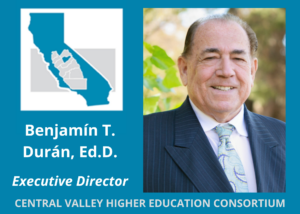 As expected, her presentation was inspiring and reflected her commitment to students in the state. Dr. Christian took this opportunity at the summit to announce and launch the CCCCO Central Valley Transfer Pathways Demonstration Project that will build upon the progress of our own Transfer Project partnership between the community colleges, the CSUs and UC Merced here in the valley. The CCCCO project is unique in California in that it includes the three segments of public colleges and universities and will eventually include the independent universities as well.
As expected, her presentation was inspiring and reflected her commitment to students in the state. Dr. Christian took this opportunity at the summit to announce and launch the CCCCO Central Valley Transfer Pathways Demonstration Project that will build upon the progress of our own Transfer Project partnership between the community colleges, the CSUs and UC Merced here in the valley. The CCCCO project is unique in California in that it includes the three segments of public colleges and universities and will eventually include the independent universities as well.
In this issue’s “What the CV-HEC is happening” blog, you will read an update about CVHEC’s innovative approach to delivering college dual enrollment math courses for high school students throughout the region via our Math Bridge project in partnership with CVHEC partner, College Bridge. The project, designed to get high school students through their first gateway college math course, will serve as a springboard for completing their degrees.
Also please plan on attending the virtual zoom San Joaquin Valley Affordable Internet Adoption Summit on Thursday, Nov. 9, from 8:30 a.m. to 12:30 p.m. The deadline to register is Nov. 7 at: https://bit.ly/SJVSummitRSVP. Bringing affordable broadband internet services to the most vulnerable populations in the Central Valley is an important part of the work CVHEC does in the valley.
Finally, enjoy our summit photo galleries where we share images and comments about the recent CVHEC summit as well as the board meeting and reception they day before. I am sure you will see many familiar faces.
Have a great November and a wonderful and restful Thanksgiving Holiday with family and friends!
CVHEC Summit 2023 wrap: a myriad of takeaways for participants
Porterville College President Claudia Habib (third from left) introduced CVHEC Summit student panelists Hailee Guerra, Araceli Tilley, Jesús López Nuñez, Alondra Veloz and moderator Dr. Carole Goldsmith, chancellor of the State Center Community College District.
Student panelist ‘earns’ a trip to CCLC to share
her transfer experiences statewide
BY TOM URIBES
CVHEC Communications/Media Coordinator
See CVHEC Summit Media Coverage: KVPR Radio and GV Wire. (MORE)
For Araceli Tilley, an alumna of Merced College, the Program Pathway Mapper used by the CVHEC Transfer Project proved to be not only useful for her transfer to UC Merced in fall 2022, it provided her an easy way to map her college courses for her final two years of college at UC Merced that is leading up to graduation in May 2024 with a degree in psychology.
Araceli shared her experiences on the student panel at the Central Valley Higher Education Consortium Summit 2023 held in Fresno Oct. 20 where the breadth and depth of CVHEC activities such as the Transfer Project were showcased. The summit is sponsored by College Futures Foundation.
She was joined by four other students who shared their experiences in activities CVHEC has sponsored and how much their success could be attributed to those initiatives: Hailee Guerra, Araceli Tilley, Jesús López Nuñez and Alondra Veloz.
“The mapper provided a straight path that really helped me out, especially because counseling and advising is super impacted at many colleges and you don’t always get to meet in-person with advisors so it was nice that I was able to self-direct using it,” Araceli said.
“And since I worked at Merced College as an outreach ambassador, I was able to help other students showing them how it works. It’s a very useful tool, especially for students who are self-directed.”
From a major announcement to kick off the day to the student testimonials, the CVHEC Summit Oct. 20 at the Fresno Convention Center accomplished its goal of convening educators and community leaders to continue developing a unified voice for higher ed issues.
“The student panel was a glimpse into the reason why educators dedicate themselves to this profession,” said Dr. Benjamín Durán, CVHEC executive director.
Araceli’s assessment of Program Mapper and how it helped her plan courses throughout college earned her an invitation by Stan Carrizosa, CVHEC regional coordinator who is the lead for the consortium’s Transfer Project, to participate in the presentation his team will make to the Community College League of California Annual Convention Nov. 16 in Indian Wells.
“I’m very excited about going to the Indian Wells conference,” Araceli said. “I didn’t expect to get asked to go to another conference but it’s a great opportunity to voice my experiences as a transfer student and how the Mapper tool helped me.”
But a key highlight of the summit came early in the day as Dr. Sonya Christian, chancellor of the California Community Colleges, returned “home” to deliver the summit keynote.
In presenting on the CCC Vision 2023 strategy plan, she announced the new Central Valley Transfer Pathways Demonstration Project, evolving from CVHEC’s own Transfer Project, to help community college students streamline the transfer process to four-year. (See story).
“As expected, Chancellor Christian’s presentation was inspiring and reflected her commitment to students in the state,” Duran said.
PHOTO GALLERIES for the CVHEC Board of Trustees and Summit Reception (Oct. 19) and
the Central Valley Higher Education Summit (Oct.20)
at the Fresno Convention Center:
CVHEC Math Task Force meets in-person Oct. 13 for AB 1705 follow-up
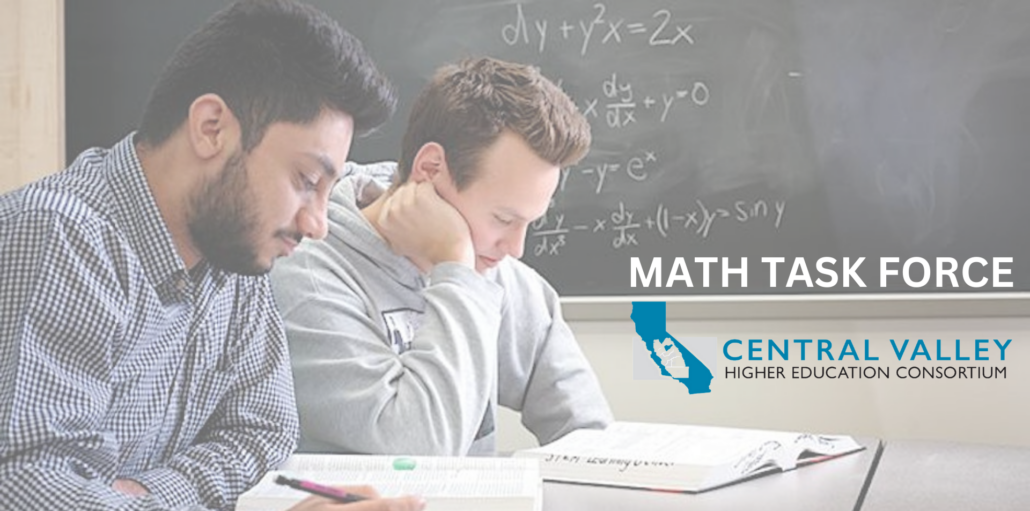
Registration is still open for the CVHEC Task Force in-person convening, “AB 1705 Student Success Workshop,” at the Fresno Convention Center Valdez Hall Oct. 13.
Impactful legislation is focus of two math convenings
as community colleges prep for deadlines
With two convenings this month, the Central Valley Higher Education Consortium Math Task Force is tackling questions regarding California Assembly Bill 1705 requiring that California’s community colleges expand their efforts to enroll and support students in transfer-level math courses.
In partnership with the California Community College Chancellor’s Office and the Charles A. Dana Center at the University of Texas at Austin, CVHEC presented the first session via zoom Oct. 6 (see recording) and the second will be an in-person convening Friday, Oct. 13, from 9 a.m. to 3 p.m. at the Fresno Convention Center – Valdez Hall (702 M Street).
Registration is still being accepted for the free all-day session which includes a lunch.
Titled, “AB1705 Student Success Workshop,” the Fresno convening will explore how to best support students within the framework of AB1705 — a follow up to AB 705, previous legislation that fundamentally reshaped placement and remediation at the community colleges.
Dana Center representatives will be present to facilitate the development of materials and strategies that promote student success in the quantitative reasoning, statistics and BSTEM pathways.
“Additionally, we will explore the skills and andragogy (pedagogy) needed for the modern calculus course,” said Dr. Benjamín Durán, CVHEC executive director.
The 18-member CVHEC Math Task Force consists of math educators and administrators representing CVHEC’s 15 community college member institutions (total 28 CVHEC members with CSU, UC and private colleges in the nine-county region).
Central Valley Math faculty, chairs and deans are invited and encouraged to attend the Oct. 13 convening, said Dr. Durán. (See registration information below).
“Throughout California, there is varied understanding of the impacts of this assembly bill on college structures and on math educators,” said Dr. Durán. “These convenings provide the opportunity for our region’s community college math educators and administrators to strategize on paths to effective implementation.”
He said this is especially critical now given the deadlines next July that were discussed in the first session last week calling for colleges to validate the effectiveness of the transfer level prerequisites to gateway STEM calculus by July 1, 2024.
That was one of the areas covered by Dr. Erik Cooper, CCC assistant vice chancellor for Data, Visualization and Research, at the first session Oct. 6 in an hour-and-half virtual meeting entitled “AB 1705 in the Central Valley.”
Cooper addressed areas of confusion regarding the bill and its implementation with 44 math educators and administrators representing most of CVHEC’s 15 community college members.
Participants were asked to review the AB1705 FAQ prior to the virtual session and submit additional questions which Dr. Cooper addressed during the Oct. 6 meeting.
Passed in 2022 for implementation July 1, 2024, AB 1705 expands the provisions established in AB 705 (2017) by explicitly requiring community colleges not only to place students directly into transfer-level English and math courses but also to ensure that students actually enroll in those courses.
The recent legislation also establishes that for students who need or desire extra academic support, community colleges shall provide access to such support. The new law clarifies that a community college can require students to enroll in additional concurrent support if it is determined that the support will increase the student’s likelihood of passing transfer-level English or math.
Cooper’s presentation included a briefing on remedial education reform; multiple measures and prerequisites; throughput (successful completion of the gateway course in the discipline ); resources for implementation of the $65 million allocation and its impact on college plans; the AB 1705 Implementation Guide and AB 1705 FAQs; transferability; using data and using data locally; prerequisite validation; course success and its potential impact on prerequisite validation; meeting deadlines and matching majors; modalities; and limitations.
For deadlines, he explained that the Implementation Guide spells out that non-STEM programs were to validate transfer-level prerequisites to gateway English and math/quantitative reasoning courses by July 1, 2023 and make changes if necessary by July 1, 2024.
“STEM programs are limited to two transfer-level prerequisites prior to gateway STEM calculus after July 1, 2024,” Cooper emphasized. “The college must validate the effectiveness of the transfer level prerequisites to gateway STEM calculus as described by July 1, 2024 and make changes if necessary by July 1, 2025.”
Dr. John Spevak, Merced College vice president-emeritus who now coordinates CVHEC’s math and English task forces, noted that decisions need to be made by this fall and that many colleges have deadlines in early 2024 if not sooner for fall 2024 catalog course listings.
“The Math Task Force is using these fall sessions to get ahead of such deadlines,” Spevak said and noting that a possible third session may be discussed at Friday’s meeting.
For more information: Angel Ramirez, CVHEC finance operations manager, angelr@mail.fresnostate.edu. (For media inquiries, contact Tom Uribes at cvheccommunications@mail.fresnostate.edu).
Registration: CVHEC in-person Student Success Workshop registration (Oct. 13)
See agenda.
(Those unable to attend the Oct. 6 virtual meeting are asked to view the recording of that session prior to the Oct. 13 meeting. The recording link will be available Oct. 7 at the CVHEC website).
See:
• Original Math Task Force fall convenings news release online
• CVHEC Math Task Force: legislation review, Math Bridge and current best practices
After a review of AB 1705 via Zoom Oct. 6, the CVHEC Math Task Force will convene in person Oct. 13 in Fresno with other valley math educators and administrators to map out strategies for student success in the law’s new environment. Registration is still available,
CVHEC DIRECTOR’S MESSAGE (October 2023)
CVHEC Summit panelists bring dynamic convos to the table
Greetings Colleagues and Friends of CVHEC,
We are delighted to welcome you to the October edition of our CVHEC e-newsletter as we enjoy fall in the valley, which is always a special time of the year.
With our 2023 CVHEC Annual Summit, “Student Success through Equity and Inclusion — Thriving in the Central Valley” just around the corner (Friday, October 20), we present our lineup of distinguished panelists and the official agenda. We are especially excited to welcome back to the Central Valley our own Dr. Sonya Christian, newly appointed Chancellor of the California Community Colleges as well as the many CVHEC board members who will introduce and serve on the four dynamic panels we are presenting this year. Dr. Christian, the former chancellor of the Kern Community College District and former CVHEC board member, will serve as our special guest and deliver the keynote address.
 If you have not registered for our no-cost summit yet, please take the time to do so. Join us as we showcase the great work being done by our colleges and universities in our nine-county region that continues to capture state and national attention.
If you have not registered for our no-cost summit yet, please take the time to do so. Join us as we showcase the great work being done by our colleges and universities in our nine-county region that continues to capture state and national attention.
You will hear about and discuss our innovative Math Bridge Project intervention for targeted high school students and our Central Valley Transfer Project, which is providing pathways to our partner universities from our local community colleges (for a preview, see colleague Stan Carrisoza’s Transfer Project update in this issue). The summit also will feature a panel of Central Valley students who have benefited directly from these initiatives.
As always, we also direct you to our “What in the CV HEC is Happening?” Blog that features guest contributors each month. This month we are pleased to share the contribution from Sanger West High School (SWHS) English teacher Jade Martínez.
Mrs. Martinez is amongst the first of our Fresno/Madera K-16 Collaborative Master’s Upskilling grads from National University. This fall, she has taken her new degree into the classroom at SWHS and is delivering her first college English dual enrollment class to her students. This, folks, is what it is all about. Great job Jade!!
We hope to see you on Oct. 20, at the Fresno Convention Center for our CVHEC Summit. Feel free to bring your colleagues and partners (registration).

